
The Salvation Army Australia


The Salvation Army Australia
A year of new beginnings 2024



“Go and do something.”
~ words of William Booth (Co-founder of The Salvation Army) to his son Bramwell when he saw the plight of homelessness in London
The following stories, information and statistics in this report reveal the positive impact we have, when together, we “go and do something” – something good.
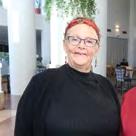


Mission
The Salvation Army (TSA) is a Christian movement dedicated to sharing the love of Jesus. We share the love of Jesus by:
Caring for people
Being there when people need us most
We offer care and compassion as a sacred encounter with transformative potential
Creating faith pathways
Taking a holistic approach to the human condition that values spirituality
We graciously share the Good News of Jesus and grow in faith together
Building healthy communities
Investing ourselves in relationships that promote mutual flourishing
We find the wholeness God intends for us in community
Working for justice
Tackling the social systems that harm creation and strip away human dignity
We join God’s work to build a fairer world where all can thrive
Vision
Wherever there is hardship or injustice, Salvos will live, love and fight, alongside others, to transform Australia one life at a time with the love of Jesus.
Values
Recognising that God is already at work in the world, we value:
Integrity
Being honest and accountable in all we do
Compassion
Hearing and responding to pain with love
Respect
Affirming the worth and capacity of all people
Diversity
Embracing difference as a gift
Collaboration
Creating partnerships in mission
Our commitment to inclusion and reconciliation

The Salvation Army Australia acknowledges the Traditional Owners of the land on which we meet and work and pay our respect to Elders, past, present, and future.
We value and include people of all cultures, languages, abilities, sexual orientations, gender identities, gender expressions, and intersex status. We are committed to providing programs that are fully inclusive. We are committed to the safety and wellbeing of people of all ages, particularly children.
As a movement, we believe inclusivity is achieved by treating all people with dignity, compassion and respect. We deliver programs with cultural sensitivity and work with diverse groups to best understand their needs. This includes people of all cultures, languages, capacities, sexual orientations, gender identities and/or expressions.
Click or scan to view Commissioner Miriam Gluyas and Colonel Winsome Merrett reaffirming the commitment to TSA’s National Inclusion Statement
As cost-of-living pressures continue for so many Australians, their quality of life and security are also affected by housing instability, local crime and international disturbances that create fear and can wear down hope and optimism.
As The Salvation Army, we believe that no one should have to ‘go it alone’ in the uncertainty and struggles of life. We are glad to be able to provide accommodation, financial support, material aid, community connection and spiritual support to those in need.
We believe in the good that comes when we follow our Vision Statement: “Wherever there is hardship or injustice, Salvos will live, love and fight, alongside others, to transform Australia one life at a time with the love of Jesus.” We do this by providing communities of hope, where practical, emotional and spiritual help is given; through community tables, where people are able to share their struggles and stories over a meal; and through gathered worshipping communities, where people
support each other in the realities of daily life, as well as in their faith journeys.
We aim to be always Jesus-centred, Spirit-led and hope revealing in our work with all Australians. We pray that as you read the stories and information in this 2024 Impact Report, you will be encouraged in the knowledge that the help of governments, businesses and individuals is being used wisely, compassionately and with beneficial outcomes to all that need our help.
We are grateful to all who help to fulfil this vision through financial, practical and advisory assistance. We continue to need your help as we seek to bring help and hope throughout our nation.
God bless you all.

Commissioner Miriam Gluyas
Territorial Commander
The Salvation Army Australia

Colonel
Winsome Merrett Chief Secretary
The Salvation Army Australia
The Board is responsible for providing governance oversight to the Australia Territory in accordance with Australian law, all requirements under International Headquarters’ Orders and Regulations, and the principles of theology, mission, integrity and compliance.
The Board is also responsible for strategically positioning the territory so that it has a sustainable, major influence on Australian society, and to provide advice and assistance to the Trustees.
The Board is chaired by the Territorial Commander and accountable to the General for its responsibilities.
Board membership for the period 1 July 2023 to 30 June 2024 is as listed:
• Commissioner Miriam Gluyas, Chair
• Major Kevin Lumb, Alternate Chair
• Mr Richard Grellman AM, Lead Independent
• Mr Greg Couttas, Chair, Audit and Risk Committee
• Ms Desley Hargreaves PSM, Chair, Quality and Safety Committee
• Ms Felicity Natoli, Chair, Professional Standards Committee
• Mr Adrian Appo OAM
• Colonel Winsome Merrett
• Captain Colin Reynolds
• Captain Leisa Humbley
• Auxiliary-Lieutenant Rosy Keane
In August 2023, the Board travelled to the Victoria Division to visit different expressions of The Salvation Army. In April 2024, the Board visited the Queensland Division.


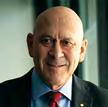

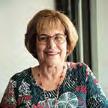






Board Committees
Audit and Risk Committee
The purpose of this committee is to ensure the integrity of the financial statements, the risk management framework and the system of internal controls, such that these align with The Salvation Army’s values and meet its legislative and regulatory obligations.
Nominations Committee
The purpose of this committee is to fairly and objectively identify and nominate suitably qualified candidates for appointment to the Board.
Professional Standards Committee
The purpose of this committee is to define and promote within The Salvation Army a world’s bestpractice response to allegations of abuse and ensure The Salvation Army is actively enhancing child safety within the Australian community.
Quality and Safety Committee
The purpose of this committee is to define and promote a culture of continuous quality improvement and consumer safety that aligns with The Salvation Army’s values and meets its legislative and regulatory obligations.
Remuneration Committee
The purpose of this committee is to assist and advise the Board on matters relating to remuneration for employees in senior roles.
Spiritual Life Committee
The purpose of this committee is to improve the depth and breadth of the spiritual life of The Salvation Army in Australia; and to guide the movement so that it operates in accordance with its God-given mission to: “share the love of Jesus by caring for people, creating faith pathways, building healthy communities and working for justice.”
Click or scan to find out more about The Salvation Army Australia leadership at salvationarmy.org.au/aboutus/leadership-and-structure/ australian-leadership
The Stronger Communities Outcomes Measurement project aims to understand and monitor how The Salvation Army Australia is progressing in achieving its mission and vision to “Transform Australia one life at a time with the love of Jesus.” The project is led by TSA Research and Outcomes Measurement Team (hereafter refer as the Research Team), in partnership with frontline services and Client Database Team.
As part of this project, measurement and reporting tools are developed to provide visibility of progress or outcomes reported by community members across diverse TSA services. These outcomes are mapped to the four TSA Outcome Domains (see Figure 1, page 12, for TSA Outcomes Framework and Appendix A, page 14, for TSA Outcome Domains definition). They are also mapped to the relevant funding bodies’ outcome frameworks. The project also captures community members’ feedback and service experience, allowing for issues to be addressed in a timely manner.
Both outcomes and service experience data have been utilised to inform support plans, referrals, and continuous improvements and learnings of our services. Mapping individual outcomes across TSA’s four overarching outcome domains also enables TSA to understand how many people have been transformed by its services, and what this looks like for the people impacted.
In November 2023, TSA Research team was a RunnerUp in the Social Impact Measurement Network Australia (SIMNA) for the Excellence in Social Impact Measurement award. The team was recognised for its work in the National Youth Services Outcome Measurement project. Mr Lee Quan, The Salvation Army’s Research Analyst leading the youth outcomes measurement project accepted the award. “We are extremely honoured to be one of the runners-up for this highly competitive group in the Excellence category,” he said.

Judges’ feedback:
“You clearly described how your national outcomes measurement framework was designed, what its purpose is, and how the framework has been applied to date. The process demonstrates rigour and a strong focus on using data for improvement. Compelling evidence regarding how your measurement, evaluation and learning process is leading to outcomes for young people is provided in the supporting evidence which shows a good mix of quantitative and qualitative data including a case study.” Judge 1
“This was a very impressive application, demonstrating notable excellence across a number of domains. You’ve created a wonderful social impact measurement program. There was particularly good consideration given to materiality and real rigour to the measurement of outcomes (consequence), stakeholder voice.” Judge 2
Click or scan to find out more about the SIMNA awards at simna.com.au/ celebration-and-inspirationthe-2023-simna-awardsceremony/

There are six key streams participating in this Stronger Communities project at a national level: Alcohol and Other Drugs (AOD), Doorways Emergency Relief (ER) and Casework Services, Family and Domestic Violence (FDV), Homelessness, Moneycare Financial Counselling Services, and Youth Services.
Doorways ER and Casework, and Moneycare Financial Counselling Services have embedded outcomes measurement into their usual service operations. Doorways and Moneycare have shared annual findings with external stakeholders, contributing to better understanding of the complex issues community members face. This has included evidence illustrating a strong relationship between financial issues and poor mental health. Additionally, Moneycare is piloting a brief client survey to understand why some people may not attend their appointment or only attend one financial counselling session. The survey will provide valuable insights about barriers to participation and how to strengthen engagement with this client group.
The Youth and AOD streams have completed the national pilot and scaling-up the implementation
of outcomes measurement across their key services. The youth outcomes measurement team is currently strengthening outcome measures for niche sub-streams, such as the inclusion of AODspecific measures for AOD youth services, and the development of measures for young people with intellectual disability.
Homelessness services have finalised their outcomes measurement framework and are preparing to conduct a national pilot of the measurement tools and processes. This framework includes a national logic model and measurement tools that will enable services to capture outcomes for people who access them. The framework incorporates (1) TSA’s Homelessness Model of Care, (2) the voices of lived experience of homelessness from across Australia, (3) the input from homelessness practice specialists, leadership, and service delivery staff, (4) funding agreements and policy documents, and (5) a comprehensive research literature review.
The second stage of FDV outcomes measurement is being conducted in collaboration with the Centre for Social Impact - University of Western Australia (CSI UWA). The first stage of FDV outcomes measurement pilot identified the >
need to further develop indicators that could be administered amidst intensive administrative data collection and at a time of high vulnerability for victim survivors. In the second stage of this project, the FDV logic model has been revised by CSI UWA with input from TSA Research team and FDV Specialists to incorporate findings from first pilot, and the recently released FDV Model of Care and case management practice guides. The project team (CSI UWA & TSA teams) is currently working on finalising outcomes measurement tools, logistics for a national pilot, and consultation with clients and people with lived experience. TSA research and FDV team is also finalising the formation of an advisory network, which consist of representatives from government (all states and territories), victim survivor advocates, frontline staff, peak bodies, specialist researchers and non-TSA FV services to further guide the development and implementation of TSA FDV outcomes measurement framework. The advisory network will ensure FDV outcomes measurement provides the necessary insight to strengthen service delivery, supports sector outcomes measurement development, and meets future funding body requirements in a rapidly changing sector.
Outcomes measurement frameworks and tools have also been implemented on smaller-scale programs such as the Family Place Logan, the Positive Lifestyle program, Townsville Indigenous Youth Resilience and Leadership program, Emergency Disaster Assistance program, youth transitional support service, some youth educational/life-skills workshops, Modern Slavery Transitional Housing program, and Family Violence Carinya Therapeutic program; and are under development for Indigenous COACH Mentoring program, Youth Drive for Life program and FV Own My Life program.
1. Accessible and Meaningful: Outcomes measurement tools and processes are useful, relevant, trauma-informed, culturally-appropriate and accessible to those involved.
2. Participatory and Collaborative: We value the collective knowledge and expertise of our frontline team, people with lived experience and our community partners. Thus, participation and collaboration with these stakeholders are actively sought. We also strive to ensure that our projects are inclusive of all communities, such as Aboriginal and Torres Strait Islander peoples and people from diverse cultural backgrounds, through active consultation, collaboration, and the establishment of advisory and steering groups that include representatives from these populations.
3. Holistic: When developing our outcomes tools, we value and take into account the physical, emotional, spiritual and social wellbeing of people, their connections to the communities and environments around them.
4. Ethical: All outcome measurement projects are aligned with the Australian National Statement on Ethical Conduct in Human Research and the Australian Government Guide to Evaluation under the Indigenous Evaluation Strategy to protect the wellbeing of those engaged in the projects and to ensure that the benefits of projects would be shared with the stakeholders.
Based on those principles, TSA Research team works closely with frontline teams and seeks input from people with lived experience to ensure the outcomes measurement and reporting tools are appropriate, feasible to administer, useful, and accessible to TSA
services and people that we support; while still aligning with measurement best practices. The findings from outcomes measurement have also been used to inform TSA advocacy and government submissions.
Currently, we are increasing our capability to develop outcomes dashboards using the latest software and to present findings in more accessible formats for all stakeholders. Therefore, promoting evidencebased practice in daily operations, such as the use of outcomes data to inform individual support plans and to review client’s progress in desirable areas, as well as identifying service-level outcomes for continuous improvement and learning. The holistic nature of outcome measurement may also help to identify other areas that community members would like to tackle, which sometimes are addressed through referral services.
When developing an outcomes framework, the research team also considers the diversity of
funding reporting requirements and their outcomes frameworks to ensure services across the nation meet their reporting requirements. This ensures TSA remain competitive in maintaining current funding and in securing new funding opportunities. Where possible, TSA client database team also develops automatic and safe data upload to funding bodies’ databases, which allow TSA frontline services to use only one database to report to multiple funder or government databases. This strategy has reduced the administration burden of data collection, allowing workers to focus on supporting community members.
As all key streams are progressing with their outcomes measurement implementation, TSA will have more visibility in its collective progress and mechanisms towards achieving its mission and vision. For more information about the Stronger Communities project, please email research@salvationarmy.org.au.
“Wherever there is hardship or injustice, Salvos will live, love and fight, alongside others, to transform Australia one life at a time with the love of Jesus.”
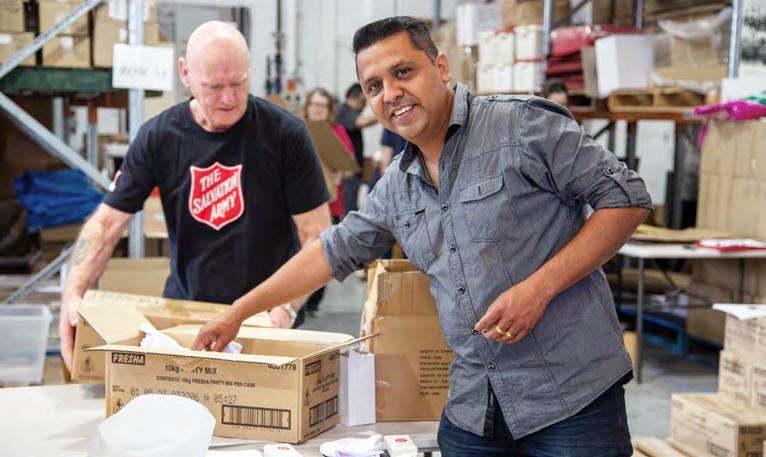
The Salvation Army is a Christian movement dedicated to sharing the love of Jesus by:
CARING FOR PEOPLE CREATING FAITH PATHWAYS BUILDING HEALTHY COMMUNITIES WORKING FOR JUSTICE
This mission informs the outcomes we want to measure.
The Salvation Army uses sector-specific frameworks and best practice to promote change across the following outcome domains:
WELLBEING AND SPIRITUALITY
INDIVIDUAL CAPABILITIES
SOCIAL CONNECTEDNESS LIFE CIRCUMSTANCES
By measuring these outcomes, we determine our impact and the extent to which we are achieving our mission and vision.
The Salvation Army measures and evaluates the impact of our work in fulfilling our mission and vision and this information is used to improve our services:
PRACTICALLY (CARING FOR PEOPLE AND WORKING FOR JUSTICE)
SOCIALLY (BUILDING HEALTHY COMMUNITIES)
SPIRITUALLY (CREATING FAITH PATHWAYS)
Our outcomes measurement framework enables greater accountability and supports our continuous improvement. It is a significant milestone on our journey towards understanding and appreciating our full impact.
› Figure 1: The Salvation Army Overarching Outcomes Measurement Framework

TSA AOD services are designed to respond to a range of needs and severity in relation to AOD use, and to serve diverse, marginalised and vulnerable population groups. The services aim to prevent and reduce harms for both individuals and the wider community and to support the reduction and cessation of use of substances.
Madeleine* admitted herself to a TSA AOD residential treatment program for methamphetamine and cannabis use. She reported a history of eating disorders, sexual abuse, domestic violence and physical abuse, anxiety and depression, PTSD, borderline personality disorder, and ADHD. Madeleine’s drug use, mental health problems and eating disorder all started in her early teens but became worse when she lost custody of her daughter. She has a young daughter that currently lives with another family member, from whom she is estranged. A few years ago, Madeleine had another child who sadly passed away.
Since this traumatic event, Madeleine has relied heavily on drugs and alcohol to cope with her grief. She has made several previous attempts at rehabilitation. Madeleine also has some ongoing legal involvement, and she is currently homeless - often living in hotels and couch surfing.
Madeleine was committed to her recovery from the outset of her engagement with TSA. She identified personal goals including improving her mental and physical health, securing appropriate housing and regaining custody of her daughter. Madeleine was supported to engage with one-on-one and group sessions, as well as additional external support including NA meetings, a psychologist, a dietician, and several mental health education networks to support her post recovery. TSA caseworker also supported her to make an application to the Department of Housing. Madeleine was proactive in her recovery, often taking on additional work in her own time and increasing her community support networks. The extra work she put in enabled Madeleine to complete her treatment program one week earlier than scheduled.
Madeleine integrated well into TSA rehab centre community, forming several positive friendships with other participants. She was open and understood the importance of communication in building her selfesteem and ongoing support networks. Madeleine was also able to identify the benefits of positive thinking and worked hard to challenge negative thoughts. She stated that she had been given the skills and knowledge to maintain her sobriety and was grateful for the opportunity and supports given to her. The outcomes measurement results indicated that Madeleine had achieved successful clinical outcomes in reducing her methamphetamine use, improving her physical and psychological health, and her overall quality of life (Measured using ATOP). In addition, her SURE outcome scores demonstrated that she is recovering from problematic substance use.
Upon discharge, she plans to live with her grandparents until she can secure her own housing. She is also looking forward to the arrival of another child later in the year.
*Name changed to protect privacy
Wellbeing and Spirituality
Individual Capability
Wellbeing means a state of being well, feeling satisfied and contented. Wellbeing and spirituality domain is multidimensional and holistic in nature, encapsulating many different aspects of life such as physical and mental health and wellbeing, spiritual wellbeing, life satisfaction, sense of meaning or purpose, happiness and flourishing in life.
Individual capability1 refers to: personal attributes, attitudes, competency and behaviours that help people to function reasonably well in life and act constructively when dealing with stressful events or hardships. This domain includes but is not limited to:
• Skills, knowledge and competency
• Coping strategies, resilience
• Personal traits, attitudes, outlook on life, and mindsets
• Social functioning skills and life skills
• Self-advocacy
• Self-efficacy
• Positive behaviours
Life Circumstances
Social Connectedness
Life circumstances2 refers to: the circumstances and environments in which people live, which impact directly on their health and wellbeing and their ability to mitigate stressful events and hardships. These circumstances may include, but are not limited to:
• Living conditions, e.g. housing situation.
• Economic resources, e.g. ability to meet basic needs (food, paying for bills and rents)
• Income and employment, e.g. secure employment, living wage
• Education, e.g. opportunities for learning, education status, school attendance, school engagement
Social connectedness3 means: the degree and quality of connections and interactions between a person with their significant others, family, friends and their community, which contribute towards the person’s wellbeing and enable them and the society to function effectively, including during times of hardship. Healthy social connections at individual and community levels provide people with emotional and material supports in times of need, and the opportunity to share knowledge and information in order to flourish in life and to reduce or rebuild from the negative impact of stressful events and hardships.
This domain includes, but is not limited to, social supports and networks, social engagement and participation, social cohesion, social capital and community resilience.
1. Definition is informed by https://www.forgov.qld.gov.au/identify-capabilities-you-need (26/08/2019)
2. Definition is informed by Scottish Public Health Observatory https://www.scotpho.org.uk (26/08/2019)
3. Definition is informed by https://www.definitions.net/definition/social+connectedness and Full Frame Initiative (2013), Five Domains of Wellbeing: Social Connectedness, https://fullframeinitiative.org/wp-content/uploads/2011/05/SocialConnectedness_Factsheet.pdf, accessed 29th August 2019.
The Salvation Army’s national Social Mission team has received overwhelmingly positive results in a recent accreditation process.
The department undertook Health and Community Services Standards Accreditation (QIC), a review process that analyses community- and wellbeingfocused programs according to five standards: governance, management systems, consumer and community engagement, diversity and cultural appropriateness and service delivery.
These standards were applied to all four Social Mission focus areas: alcohol and other drugs, homelessness, family violence and youth services. In all these areas, the auditors found no areas of non-conformance, with some opportunities for improvement serving as a guide to make social services even more effective, according to Chief Secretary Colonel Winsome Merrett.
Head of Quality and Safeguarding Bernadette Roberts said the accreditation reviewers’ response to the audit of Social Mission was genuinely
heartfelt, and their positive feedback was consistent across all Social Mission sites, streams, business partners and mission-enabling functions.
“It was encouraging to see the multitude of examples that clearly demonstrate person-centred, safe, seamless and effective experiences for the people Social Mission support,” Bernadette said.
The auditors’ feedback reflected that Social Mission personnel demonstrated a clear commitment to the department’s mission, vision and values in all areas. Feedback from external stakeholders confirmed that TSA’s social services are considered a ‘benchmark’ in the industry.
“This exceptional result can be attributed to our organisational culture, with the auditors sharing that staff at all levels stated they feel supported, safe, valued and empowered,” Winsome said.

The Salvation Army has a long history and strong capacity to respond to the immediate needs of those experiencing or at risk of homelessness. While our services and programs vary in offering and size, they are united by a singular vision: by ending homelessness, we transform lives and communities, restoring hope and dignity wherever there is hardship or injustice.
The Salvation Army is committed to upholding every person’s right to be safe, empowered and free from violence. Through early intervention and prevention services, we support survivors and their children to feel safe, while holding perpetrators to account whilst providing support for them to change
The Salvation Army offers a range of recognised services and programs that enable and support recovery from alcohol, drug and gambling addictions.
The Salvation Army’s network of youth services offers targeted programs that engage youth across Australia as they transition to independence. These programs include youth homelessness services, driver training, educational programs, drug and alcohol addiction support, youth justice programs, mental health programs, counselling, chaplaincy, advocacy support, creative arts and multimedia.
The Salvation Army Emergency Services (SAES) have served Australian communities for more than 50 years. Whether it’s a natural disaster or a missing person search, SAES volunteers are among the first to arrive on the ground, providing support to victims and emergency personnel on the frontline. The Salvation Army is committed to staying for as long as it takes for local communities to recover.
(material aid, community programs, financial inclusion, financial counselling and poverty alleviation)
Every week, 280+ Salvation Army community support services and emergency relief centres assist thousands of Australians experiencing disadvantage. For people facing hardship, these services help alleviate poverty by addressing immediate needs, such as food, shelter, clothing and utility assistance. Additionally, these services connect clients with long-term support services to build capacity and resilience through financial counselling and case management.
Salvation Army chaplains provide practical, emotional and spiritual support to people facing a crisis, coping with trauma or with a need for a listening ear. Chaplains provide one-on-one support, spiritual guidance, prayer, worship, education, advocacy, conduct Christian ceremonies, and more. They draw on their Christian faith, training and experience, and use a variety of appropriate resources designed to enhance a person’s holistic wellbeing. They believe in the possibility of a better future for everyone, where lives are transformed through the love of Jesus.
The Salvation Army is primarily driven by people working passionately to make a difference to the lives of individuals and families who, due to adverse life circumstances and experiences, are disadvantaged by compromised capabilities and opportunities to fully participate in community. Equipping and enabling local people to impact their own community has always been a key focus of The Salvation Army. Today, the need for our services is on the rise. But with your support we are able to empower the vulnerable to prosper financially, socially and spiritually.
The Salvation Army’s Serenity House in Mount Isa, north-west Queensland, received the ‘Excellence in Community Homelessness Services Delivery’ award at the city’s 2023 Community Services Ball. Serenity House is a residential homelessness support service in Mt Isa, offering five units for women and children experiencing homelessness. This year, the service began mobile community support to assist more women in need who are unable to access accommodation at Serenity House due to the service being in such high demand. Recently, the service also gained a grant to continue running a successful pilot program of a weekly women’s group called ‘Life Matters’. “The group aims to reduce
The launch of an innovative youth-supported accommodation facility in Shepparton has heralded an exciting fresh chapter for The Salvation Army’s Northeast Victoria Youth Services. Giving local young people hope and positivity for their future is the purpose-built facility that features 13-bed supported accommodation for young people aged 16 to 25 who are experiencing homelessness or at risk of homelessness. Leah Farnham, Northeast Victoria Youth Services Regional Manager says, “So, part of it is really about making sure they are not perpetrating the cycle of homelessness and that we’re getting them when we need to. Early intervention. It’s exciting.”
social isolation for women in our remote community,” Serenity House Manager Melissa Warhurst says.

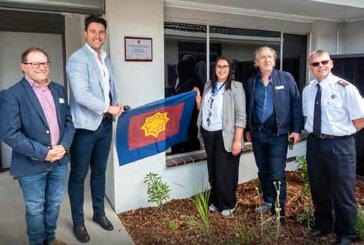
Salvation Army Emergency Services respond after Sydney home explosion
NSW/ACT SAES Response Coordinator Norm Archer said he and other team leaders were at a training weekend at The Salvation Army’s Collaroy Centre on Sydney’s northern beaches when a call came through on Saturday 1 June that a team was required to support a multi-agency search and rescue operation at a residential street where a home had exploded.
Torrential rain made conditions tough for all involved, so Norm said bringing a hot meal and a warm smile to those working at the scene was good. The first response crew worked throughout the night, with warm soup and other snacks available to the police, ambulance officers, fire brigade personnel and others at the scene.
“We did our best to bring hope and a friendly face in what was a very sombre occasion,” said Norm.

Doorway to hope at Preston Amid the laughter of people playing board games and sharing in craft activities, the rustling of newspapers and the aroma of freshly cooked snacks, community connections and friendships are growing at the drop-in centre at Preston Corps in Melbourne.
Serving a culturally and linguistically diverse community in this north-east suburb, the service’s drop-in space welcomes all, including those who access The Salvation Army Doorways, which offers emergency relief and care.
Neda Shavandi, regional Doorways manager for Victoria-West, says, “The Preston drop-in centre is beautifully aligned with The Salvation Army’s Doorways model, inviting isolated community members to feel comfortable and connected. Support is about much more than a voucher or food parcel – it’s also about creating a sense of belonging.”

Language no barrier in Cairns
The Salvation Army’s Moneycare service in Cairns has delivered a financial literacy training program through an interpreter to assist members of the local African population. Moneycare Queensland Team Leader Amanda Rees said the Cairns Corps has an African congregation and its officer identified that some financial literacy training would benefit members of the congregation. Local Moneycare Financial Counsellor Kevin van Kuijk jumped at the opportunity to reach more members of the local community and organised training with an interpreter. About 20 people attended the day.

Providing free healthcare for Tasmanians doing it tough
A medical lifeline for people suffering hardship in the heart of Tasmania’s Glenorchy community is giving dignity to those who need it the most. The Salvation Army’s Doorways program has joined forces with The Moreton Medical Group to facilitate providing free healthcare to people who are unable to access a general practitioner or are unable to afford medical care.
“Working with The Salvation Army has meant a collaborative approach to client management that addresses not only the immediate health needs of the community but the underlying causes,” Nurse Practitioner Kris Mullins said.
The Salvation Army Family Connections parenting centre in Ballarat, Victoria, in collaboration with the Delacombe Corps offers up to eight free groups and programs for parents and children. The centre, based out of Karinya Support Services, which also includes Parker Place transitional housing residence and LARF (Life skills, Activities, Relationships and Fun) mentoring program, seeks to equip mothers of children and teenagers of all ages and provide a social connection for mothers. Alison Ford is a Family and Children’s Facilitator at the centre and said Family Connections had grown into an extremely busy, energetic and responsive initiative that reached members of the community who might otherwise remain isolated.
Salivating Cooking Program
As the cost of living continues to rise the Salivating Cooking program at Noosa/Coolum Salvos helps participants make the most of their grocery shop, learn new culinary skills and create tasty dishes too. Tony, an accomplished chef, generously donates his time to teach and has found that he loves being part of this community as much as his students.

Partnerships play a vital role in living out The Salvation Army’s mission of transforming lives and restoring communities. One such partnership is the collaboration between The Salvation Army and Red Dust, a community organisation, implementing intergenerational Alcohol and Other Drugs (AOD) programs for men aged 18 and above on Arrernte lands in Alice Springs. The program takes a traumainformed approach, acknowledging the impact of personal and intergenerational trauma on people and their journey to recovery. This critical approach establishes a sense of safety and trust through the various activities Red Dust runs throughout the year.
Tweed Salvos Breakfast Program
Some families are struggling to provide meals in these tough economic times. With the goal of helping parents and giving each child a good start to the day, Tweed Heads Salvos have partnered with local schools to provide breakfast for children. Seeking to serve the community this way has made a big difference to the schools and the volunteers.
Click or scan to view the Salivating Cooking Program Noosa/Coolum Salvos
Click or scan to view partnership between Tweed Heads Salvos and the local schools to offer breakfast

1.67+ million sessions of care provided across all social programs
1.67+ million sessions of care provided across all social programs
nearly $25 million of financial assistance provided in cash, gift cards, vouchers, etc
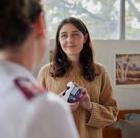
250,000+ people assisted across all social programs provided 1.2 million+ nights of accommodation across all social programs
300+ Salvation Army corps (churches) in the community
700+ Salvos officers actively serving in the community
nearly 439,000 church attendances on weekday and Sunday
1.63+ million meals provided to people who accessed homelessness services Homelessness
nearly 820,000 crisis beds provided to people who experienced homelessness
Employment Plus assisted 36,000+ job seekers to find employment
Salvos Funerals
nearly 600 families served with their funeral needs
Salvos Housing
3000+ people provided with housing
more than 13,000 people provided financial counselling Moneycare
Doorways & Mission and Communities
more than $16.6 million of financial assistance distributed
123,000+ nights refuge/emergency accommodation provided 10,000+ women and children supported Family and Domestic Violence (FDV)
Salvation Army Emergency Services (SAES)
$8.3+ million of financial assistance distributed to those impacted by disaster
Youth more than 4200 young people assisted
Salvos Stores
42 million+ items were sold for reuse in Salvos Stores translating into a remarkable reduction of 583,800 tonnes of CO2 emissions
Addiction
12,000+ people assisted with addiction to alcohol and other drugs, gambling at rehabilitation services
The Salvation Army is the largest provider of homelessness services across the nation, where nearly 40,000 people received 315,500 sessions of care during 2022-23.
We provide services to men and women, young people and families with accompanying children. Our services include accommodation, case management, assertive outreach support, financial assistance, together with connection and referral to other specialist services. Our philosophy is that every person is afforded dignity, respect, and quality services and that no one should be left without a safe, affordable, and secure home.
Homelessness can affect anyone – it doesn’t discriminate. People may find themselves in unstable housing situations that can range from uncomfortable to distressing and dangerous. Services such as ours support people experiencing homelessness to find a permanent and safe place to live, positive community connections, and are provided with services to address any underlying reasons for the person’s homelessness.
We believe that having safe, secure and affordable housing is a human right. Without housing, a person’s chances of accessing and maintaining employment, education, training, family and social networks, and good health and wellbeing, can be compromised, and often impossible, further exacerbating the situation. Many people misunderstand homelessness to primarily be those who are sleeping rough on any given night (sleeping outside or in cars, doorways and abandoned buildings etc.). In actual fact, those sleeping rough in Australia represent just over 6% (7636) of the total number of people experiencing homelessness (ABS Census 2021 https:// www.abs.gov.au/statistics/people/housing/ estimating-homelessness-census/latest-release
Homelessness can take many forms, and most people experiencing homelessness go unseen, living in temporary accommodation, cars, motels, couch surfing with friends or staying in severely overcrowded housing.
For this reason, the Australian Bureau of Statistics has defined homelessness as when someone is living in one of the following:
• A dwelling that is inadequate; or
• Has no tenure, or if their initial tenure is short and not extendable; or
• Does not allow them to have control of and, access to space for social relations.
This definition provides an accurate way of recording levels of homelessness in Australia to inform the way in which services and support are provided.
Click or scan to view source of homelessness statistics ABS Census 2021
122,494 men, women and children were identified as being homeless
24,291 people were living in supported accommodation for the homeless
22,137 people were living in boarding houses
7,636 people were living in improvised dwellings, tents or sleeping out
16,597 people were staying temporarily with other households
47,895 people were living in ‘severely’ crowded dwellings
3,394 people were in other temporary lodging
› Source: ABS Media Release on Homelessness 2021
Homelessness is fundamentally caused by structural issues such as poverty, low income, and a lack of access to safe, affordable housing.
Common misconceptions are that homelessness is primarily caused by individual factors, such as poor mental health, lack of employment or involvement with the justice system. These are not causes of homelessness, but can, (together with other factors such as past experiences of trauma, relationship and family breakdown, alcohol and other drug use) place people at higher risk of experiencing homelessness.
Staff and clients consistently tell us that the depth, breadth, and ongoing escalation of unaffordable housing is impacting negatively on the lives and welfare of increasing numbers of Australians and
resulting in homelessness. Together with the additional challenges posed by the rising cost of living, the links between income inadequacy, poverty, housing affordability and homelessness are wellestablished. These issues are so entwined that the experience of one form of disadvantage can lead a person to also experience others.
Where housing insecurity and homelessness were once the domain of individuals experiencing personal challenges, whole sections of the community-at-large are now impacted.
Homelessness has a profound impact on people’s lives. It can cause poor health, disengagement with school and community, and result in loss of confidence and self-esteem.
The impact of homelessness is far-reaching and long-lasting. It can contribute to a lack of connection to family, friends and community, poor mental and physical health, decrease personal safety, and privacy. Homelessness can negatively impact access and participation in education and work, and hinder freedom of movement and expression. It also affects not just the individual, but their family members, friends, and the wider community.
Homelessness can happen to anyone. Nevertheless, statistics and research have shown that some sections of our community are overrepresented; for example, Aboriginal and Torres Strait Islander peoples, women over 55, children and young people, LGBTIQA+ communities, culturally and linguistically diverse (CALD) communities, people with disability, and veterans
The Salvation Army recognises this in the services we provide and works together with non-government and government agencies to provide targeted support and services to lessen this increased risk.
The Salvation Army recognises that the experience of homelessness in itself is traumatic, and that once someone has had one experience of homelessness, they are at increased risk. We therefore work to ensure that any experience of homelessness is rare, brief and non recurring.
HOMELESSNESS FACTS – REASONS FOR PRESENTING AT A SALVATION ARMY HOMELESSNESS SERVICE
Data gives us a sense of people’s experiences of homelessness. In 2022-23, the following five reasons were provided by people presenting at Salvation Army homelessness services as the main reason for seeking support:
WHAT IS THE SALVATION ARMY DOING TO HELP PEOPLE AT RISK OF HOMELESSNESS?
The Salvation Army’s social programs assist close to 200,000 vulnerable people every year. These services help people currently experiencing hardship or crisis including homelessness, but also seek to address some of the factors driving experiences of homelessness.
This includes:
Supporting survivors of family and domestic violence with finding a safe place to live.
Financial difficulties
Inadequate or inappropriate dwelling
Transition from custodial arrangements
CHILDREN AND YOUNG PEOPLE EXPERIENCING HOMELESSNESS
A large group of Australians presenting to Specialist Homelessness Services are children, as part of families and households and presenting alone. Children and young people experiencing homelessness may be sleeping in cars or temporarily with friends or family – in what could be classed as ‘severely’ crowded dwellings.
Offering practical support as well as financial coaching and counselling to people experiencing financial hardship (including in the wake of an emergency or disaster) so they can pay their rent/mortgage.
Working with people to overcome alcohol and other drug addictions.
HOMELESSNESS SUPPORT
The Salvation Army homelessness support services include crisis accommodation, transitional housing and affordable housing, in addition to a range of programs that seek to intervene early and prevent homelessness from occurring in the first place. All of these services operate to support people to a more stable future.
CHILDREN AND YOUNG PEOPLE’S HOMELESSNESS STATISTICS 2022-23:
Over 38,300 young people presented alone (without an adult) to Specialist Homelessness Services
Nearly 5 in 10 young people aged 15-24 assisted by Specialist Homelessness Services had a current mental health issue
Of the children aged 15-17 presenting alone to Specialist Homelessness Services agencies, 65% were female
1.67 MILLION OF SESSIONS OF CARE PROVIDED ACROSS ALL PROGRAMS
36% Other Support Services 18% Homelessness 14% Alcohol and Other Drugs addiction
Doorways Emergency Relief
Mission and Communities
Youth
Family and Domestic Violence
Moneycare 2% Doorways Case Management 1% Emergency Services
Nearly $25 million of financial assistance provided in cash, gift cards, vouchers, etc
250,000+ people assisted across all social programs
Provided 1.2 million+ nights of accomodation across all social programs
1.63+ million meals provided to people who accessed homelessness services
Nearly 820,000 crisis beds provided to people who experienced homelessness
Launched in 2023, The Salvation Army’s Homelessness Stream Model of Care brings together in a single foundational document, the evidence, research, practice wisdom, learnings and experience required to provide a consistent and informed approach to homelessness service provision across the range of programs and services that comprise the Homelessness Stream.
The following guiding statements underpin the Model of Care and represent the foundations upon which our service delivery is framed:
Principle 1 Ending homelessness is possible
Principle 2 Safe, secure, and affordable housing is a human right
Principle 3 Homelessness is everybody’s business
Principle 4 Services uphold dignity and selfesteem and recognise the intrinsic value of human life
Principle 5 Homelessness can affect anyone; its impacts are far reaching and long lasting
Principle 6 Homelessness in Australia is a result of systemic and structural failures or inadequacies
Principle 7 The voices of people with lived experience should inform all that we do
Principle 8 Housing and support services must be accessible and tailored
The case studies/stories that follow give insight into the exceptional work of our homelessness teams, whose tireless dedication to walk alongside and serve others gives life to the undertakings and aspirations outlined in our Model of Care and of the fundamental mission and values of The Salvation Army.
“Despite the dire challenges of the dual cost of living and housing affordability crises affecting people and communities across Australia, we continue to see remarkable stories of hope and transformation. When we can support somebody into a secure home - often after a difficult and harmful period of insecure housing or homelessness - it is both thrilling and humbling to witness the many ways that the lives of people are transformed. From renewed opportunities to address critical areas of their lives that have been put on hold such as health, mental health, education and employment, family reconnection and relationships through to engaging in activities to support others, time and time again the provision of a home sets people on a trajectory for a dignified and productive life.” (Dr Jed Donoghue, General Manager of Homelessness at The Salvation Army)
Joy* was referred to our program due to experiencing homelessness. Once she had settled in and built rapport with staff, she began to feel comfortable to share her story. Joy had married an Australian resident overseas and moved to Australia. However, once here, her husband kept her captive in his accommodation and repeatedly sexually assaulted her. He told Joy that she was never to leave their house and for many months she didn’t. One day, however, she opened the bedroom door, walked out of the house and straight to a local police station where she received support and was linked in with a homelessness entry point.
When Joy arrived at our residential program, she was lost and extremely traumatised. She had no income or working rights and very limited English. Through advocacy, her case managers were able to link Joy with specialist services to assist her in gaining knowledge and skills to live independently and connect her with a community health provider for people who are not eligible for Medicare.
Additionally, Joy was linked to a women’s legal
immigration lawyer who assisted her with her refugee status. Given Joy had no income, we relied heavily on TSA’s chaplaincy stream to assist with vouchers and material aid so Joy could buy basic items such as clothing, food and hygiene products.
Over time, Joy was able to reconnect with her faith-based community and through advocacy and support, gained working rights in Australia. Whilst residing in our crisis accommodation facility, Joy secured a job at a local restaurant and started to regain some of her independence. After some time, Joy gained employed through a Social Enterprise, which offers employment to women with a history of family violence. Over time, Joy was promoted to running her own team.
Eventually, Joy was offered accommodation through an asylum seekers project where she continued to receive care and support to help heal from her traumatic past. Since then, Joy has completed her qualification in the aged care sector. Joy successfully obtained employment in this sector and has recently secured her own private rental.
This woman who has experienced incredible trauma, pain and suffering is now living a full productive life and giving back to community.

My name is Brad* and I’m a Veteran. If I go back 14 months from today, my world turned upside down. My ex-wife wanted separation - I didn’t see it coming and that knocked me for a six. At this point I attempted suicide. So, I was rushed to a hospital in Central Queensland for treatment and the doctors there decided to send me to the Keith Payne Unit (KPU), a mental health service that specialises in posttraumatic stress disorder (PTSD), drug and alcohol, depression and anxiety, and older veterans’ mental health. Whilst there, the demons of the past from my military service and the collapse of my marriage and loss of my family basically destroyed me. But with the assistance of the medical staff at KPU, I was on a road to recovery, a long road.
I was a long-term patient and by the end of that, I found out how unprepared I was to tackle the world on my own. I didn’t even have the skills to know how to operate the computer or my iPhone. Everything was done for me in my marriage – my ex-wife took care of the bills just like the Army did for me. The psychologists and doctors knew I wouldn’t land on my feet successfully without assistance. Through The Salvation Army and Department of Veterans Affairs Program, I received very strong support, which gave me a successful transition from an upside-down world to a world of purpose and direction.
What they got right for me was having the services and support organised before my discharge from hospital. The doctors and the welfare officer worked to get these services up and running before my discharge, which meant there was no stress for me in trying to organise the assistance needed after I was discharged. There were several organisations that were at my disposal, which I found were vital for me to having some sort of routine throughout the week. That included having someone to talk to.
A most important asset was The Salvation Army. The advocate that I was assigned to was relentless in assisting me finding more than a home, but a
community. Finding a community that I could easily interact with and be a part of. That involved one-onone support to inspect accommodation for myself. It also involved sitting down one-on-one on the internet finding and drawing up profiles for me to find a place to live. I couldn’t do it without the assistance of The Salvation Army as I had no rental background, and no knowledge of using the system to get myself accommodation.
It’s been life changing! The services that were at my disposal were vital to my initial survival. Emotionally and psychologically, they were able to carry the burden of stress for me. The services, whilst taking the initial stress off my shoulders, also gave me time to develop the strength – emotionally and psychologically – to think for myself. In turn, I was able to implement the tools that I was given to help me with my journey.
I come from a farm in Central Queensland, and I now find myself on a beach in Southeast Queensland. From running a farm and supporting a family, I now find myself in a unique position of being time-rich, and okay financially.
From owning my own home to renting a studio was a big change, but what it has done is given me new dreams and goals that I wouldn’t be able to achieve in the previous situation that I was in. I found with the hard work of The Salvation Army, finding a place where I would be happy, has lifted me and given me new direction and purpose.
Finding myself living virtually opposite the beach, the environment has given me an opportunity to find peace. With the sounds of the ocean, waves crashing, sea spray on my face, it has been a natural healing process for me that I could not find in a hospital or apartment in the city. I understand the role of medication, but the true medication is watching and hearing the waves and tasting the salt of the ocean. During this journey, I have learnt two universal languages – one is music, the other, art. With the combination of both, with the lifestyle I am starting to create for myself, my journey has just begun.
*Names changed to protect privacy

Tony had been sleeping rough in the suburbs of Perth for up to 10 years
Tony came into contact with the Assertive Outreach Team (AOT) of The Salvation Army in early 2022. The AOT are often the first contact point for the roughsleeping community and provide engagement, referrals, essential items and support in the Perth CBD and surrounding suburbs. The Salvation Army’s AOT provide the critical engagement for street present individuals and work closely with TSA’s Street Outreach Service who provide hot meals on the weekend. These services have been operating together for over a decade, with the Street Outreach Service originally commencing over three decades ago, and collectively provide crucial outreach services across a seven-day continuum.
In March 2023, The Salvation Army’s Assertive Outreach Service were provided an opportunity to engage with a local council, a few suburbs outside of the Perth CBD, to trial a mixed assertive outreach service model for a 14-week period. The Subiaco Engagement and Assessment Team (SEAT) provided
a walk-in service and a roving service, supporting a case management approach to engaging with street present individuals.
The trust and rapport that AOT had already built with Tony assisted in a warm referral into the SEAT and with team members working across the two services, provided continuity of support and played a pivotal role in Tony’s support.
SEAT team members met with Tony regularly, at both the walk-in and roving services, providing essential items and engaging in respectful conversations with Tony around Alcohol and Other Drugs (AOD) support services and accommodation options. The team walked alongside Tony until he was ready to engage with additional services. Tony would attend the walk-in service, playing his guitar and singing, bringing a light to the team and others attending the service.
Whilst the team members were there for unwavering support, Tony was the change catalyst. He engaged in an open conversation one day with the SEAT, questioning if his relationship with alcohol was becoming problematic, an indication of contemplation for change. The team seized the opportunity with Tony and discussed options for support to detox, engage in counselling for dependence and working towards accommodation. The team’s immediate
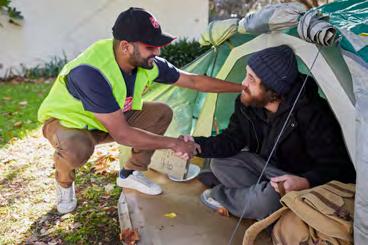
support response was further proof for Tony that the team would be there to support every step of the way.
The plan for intervention and support needed to be holistic, collaborative and coordinated. In partnership with Tony, the team arranged for the following process:
Dependence Support:
An Outreach AOD worker attended the walk-in service, completing an assessment for counselling support and detox services in a place where Tony felt safe and comfortable. Helen and Jason were there to provide assistance and reassurance. The AOD worker arranged for a referral into a Medical Detox Program and agreed to continue to provide counselling support.
Respite:
Tony was referred to an accommodation respite service, who provided seven nights of safe accommodation in a private room. Tony exited this service into Detox Services.
Detox:
Five days of medically supervised alcohol detox was provided.
Accommodation:
The SEAT worked closely with The Salvation Army’s Homelessness Services Intake Team at The Beacon accommodation facility to ensure that a bed was placed on hold for Tony. This would ensure a smooth transition from exiting detox into a safe and stable environment, where ongoing support would be available. The SEAT assisted Tony to obtain and access critical Centrelink information from a Centrelink Day Centre worker which was required for
admission to The Beacon.
Tony was supported by SEAT throughout all stages of his journey into stable accommodation, with his trust for the team evident in every interaction and the mutual respect clear.
A few days into Tony’s stay at The Beacon, he experienced a lapse, and was not able to be located. Without a phone, he was uncontactable.
The Salvation Army’s Assertive Outreach Team and The Subiaco Engagement and Assessment Team actively looked for Tony in his regular location. The Assertive Outreach Team located Tony that night and provided emotional support and reassurance, essential supplies and offered to transport him to hospital for an assessment of some facial injuries. Tony wanted to wait for his trusted allies, Jason and Helen from SEAT, to take him to hospital the following day. Tony was supported the next morning to attend the local hospital Emergency Department for an assessment and Jason and Helen waited with him in the ED for hours, ensuring that he was able to seek the treatment he needed. When the SEAT shift ended, the AOT supported Tony at the hospital and provided transport for Tony back to The Beacon.
In the next few weeks, Tony will be referred to one of the Community Outreach Programs, Street to Home, ensuring that he continues to receive support once he is living independently in the community. The support from the Assertive Outreach Teams, The Beacon and Community Outreach Teams ensures continuity of support and aims to provide Tony with every opportunity to leave his homelessness journey behind and continue to thrive in the community.



KERRIE’S STORY
After a series of traumatic events, Kerrie was shocked to find herself homeless. Eventually she found shelter, advocacy and support through The Salvation Army’s Still Waters service in Queensland.
Over the past few years, I have met women in their late 50s and over 60s living in their cars under a bridge – women who are homeless simply through life circumstances often totally out of their control. Just like me.
Without the care of the Salvos’ Still Waters (emergency and medium-term crisis accommodation service and case management), including the house they eventually helped me into, I don’t know where I would be now – most likely still living in my car. Sick and in pain. Alone.
I know now that I have value, and that there is still hope in life, but it has been a long journey.
I was the eldest of five children and the only girl. Dad worked away a lot and Mum was often sick. I didn’t know it at the time, but she was an alcoholic, so I virtually had to raise my four brothers and take care of my mother too. We also spent times in various children’s homes in our younger years.
I didn’t have a normal teenagehood either as I still had the responsibilities of the children. I loved school though, and I focused on that. I especially loved English and through it all managed to keep a sense of humour.
As I got older I got a job on the railways, had my first child and eventually got married. My four children and I faced physical and mental abuse and during that time I worked up to three jobs to support them.
After 25 years of physical and mental abuse, my son helped me move out, but the damage was done. There was no confidence left. No self-belief. I couldn’t look anyone in the eye. After the divorce I struggled. I lost the house and struggled to make ends meet. With a teenager still in my care, I worked a lot of the time and we rented a few places in caravan parks.
After my children were grown up, I was working in aged care when I started to feel unwell and had several falls. After many tests my doctor told me that as I had several complex conditions I couldn’t work anymore. With no job and having to attend many medical appointments, finding a place to live became a nightmare. I was informed that the room I was
renting would soon no longer be available. I searched for something I could afford but just couldn’t find anywhere to rent, so I started living in my car and kept looking for an affordable rental. This was so hard. I was trying to manage my health, with advanced osteoarthritis in both knees and my lower spine, and blood cancer.
At the time I felt so alone, but soon learned how many older women are facing the same situation. Women my age and older living under bridges and in cars, through no fault of their own.
One day I went to an op shop to buy a light so I could keep reading in my car. When I saw a poster in a nearby window advertising housing help I talked to a lady and she suggested I contact the Salvos. I went into the Salvos church next door and was greeted by a lovely woman named Wendy, a case worker, who took me to Still Waters. It was the best thing that’s ever happened to me. Just being at Still Waters gave me peace. Within a couple of weeks, one of the independent units there became available, with its own kitchen and ensuite. After a couple of months I started to feel alive and after eight months Wendy and the team found me a brand-new place to live in.
Today I am happy and in a better frame of mind, although I push my health a bit, but I’m okay with that. I have a nice little garden and keep busy. I read a lot – I have books everywhere.
I continue to cook for myself, something I had stopped doing before Still Waters. I put on my makeup and go out, something else I had stopped doing. I used to think I was too old for anything, but I don’t think that now.
I feel there is still a stigma and shame for homeless older people, particularly women. I felt so much shame. I had worked all my life and yet people asked me how I got myself in that situation.
The most significant change in my thinking is to appreciate life and start realising that I have always been a good person. My case worker and I had heaps of chats around loving myself and focusing on myself and my health.
I now have a beautiful new home and for that I will be eternally grateful. I feel really thankful for Salvos donors and volunteers who make such a difference in people’s lives. I have learned that no matter how far down you get, the Salvos are there to put their hand out and help you. I really do thank God for the Salvos.

The Salvation Army Australia launched its first national Reconciliation Action Plan (RAP) in December 2020, reflecting a commitment to reconciliation and truth-telling in this nation. Building on the success of the 2020 Innovate Reconciliation Action Plan (RAP) TSA has started the journey to develop a new, three-year Stretch RAP.
The Salvation Army Australia Territory has completed the ‘Innovation’ stage of its national Reconciliation Action Plan (RAP).
The goal was recently celebrated at the Yakila –Walking and Talking Together conference in the Adelaide Hills, with a cake-cutting ceremony livestreamed nationwide.
Launched in December 2020, The Salvation Army’s RAP has been driven by Strategic Manager Lucy Davis, who first came to the idea as a sceptic.
“We needed to have a national RAP, and I said I’d do it on the basis that we were actually going to make change,” Lucy explains. “We wouldn’t want it to be a token document. Blackfellas can sometimes be opposed to RAPs for that reason, so I was determined to make our own RAP the opposite. I told them so, and I still got the job.” A RAP is a framework for an organisation to contribute to the reconciliation movement. RAPs deliver tangible and substantive benefits for First Nations peoples. Over 1200 Salvos gathered in yarning circles online during the COVID-19 period, expressing a desire to see things change.
“We started by saying, ‘What are we doing now, and what can we do better?’” Lucy says.
“COVID had hit, so we had to try to do it all online in our homes, making sure we had local voices and corporate voices. There was a real expectation to come with grace, to leave preconceived thoughts prior to coming
RAPs consist of five components:

The Salvation Army recognises that its collective actions must develop relationships of mutual respect and maintain a commitment to truth and accountability with Aboriginal and Torres Strait Islander peoples.
“If you don’t get this right, there’s disconnection from country and spirit, disconnection from the First Peoples of the land,” says Lucy. “I think it’s different for a faithbased organisation because they played a massive part in disrupting Aboriginal communities and homes. There are significant disadvantaged communities in Australia that The Salvation Army either set up or played a role in operating. We have a responsibility to those people who now live in intergenerational trauma. I don’t want to work in an organisation that says, ‘It’s too hard’. This is exactly where Jesus would want us to be. This is his Equality and Equity

The RAP has impacted key areas of The Salvation Army’s engagement with First Nations peoples.
TSA Innovate RAP has allowed the implementation of the Aboriginal and Torres Strait Islander Cultural Capability framework (ATSICCF) including resources, supporting documents and toolkits to assist in:
• Recruitment and Retention
• Internal Aboriginal and Torres Strait Islander Engagement Procedure
• Cultural Learning Approach
• Cultural Learning Standard
Next stage of the RAP
The ‘Stretch’ RAP concept brief was submitted in May this year and consultation (RAP Circles) will begin in August with the launch date currently scheduled for February 2025. Key targets will be to engage First Peoples in every community where The Salvation Army is present, to have an active target for Aboriginal and Torres Strait Islander employment, to review the organisation’s Closing The Gap strategy, and to develop and undertake a truth-telling process in communities.
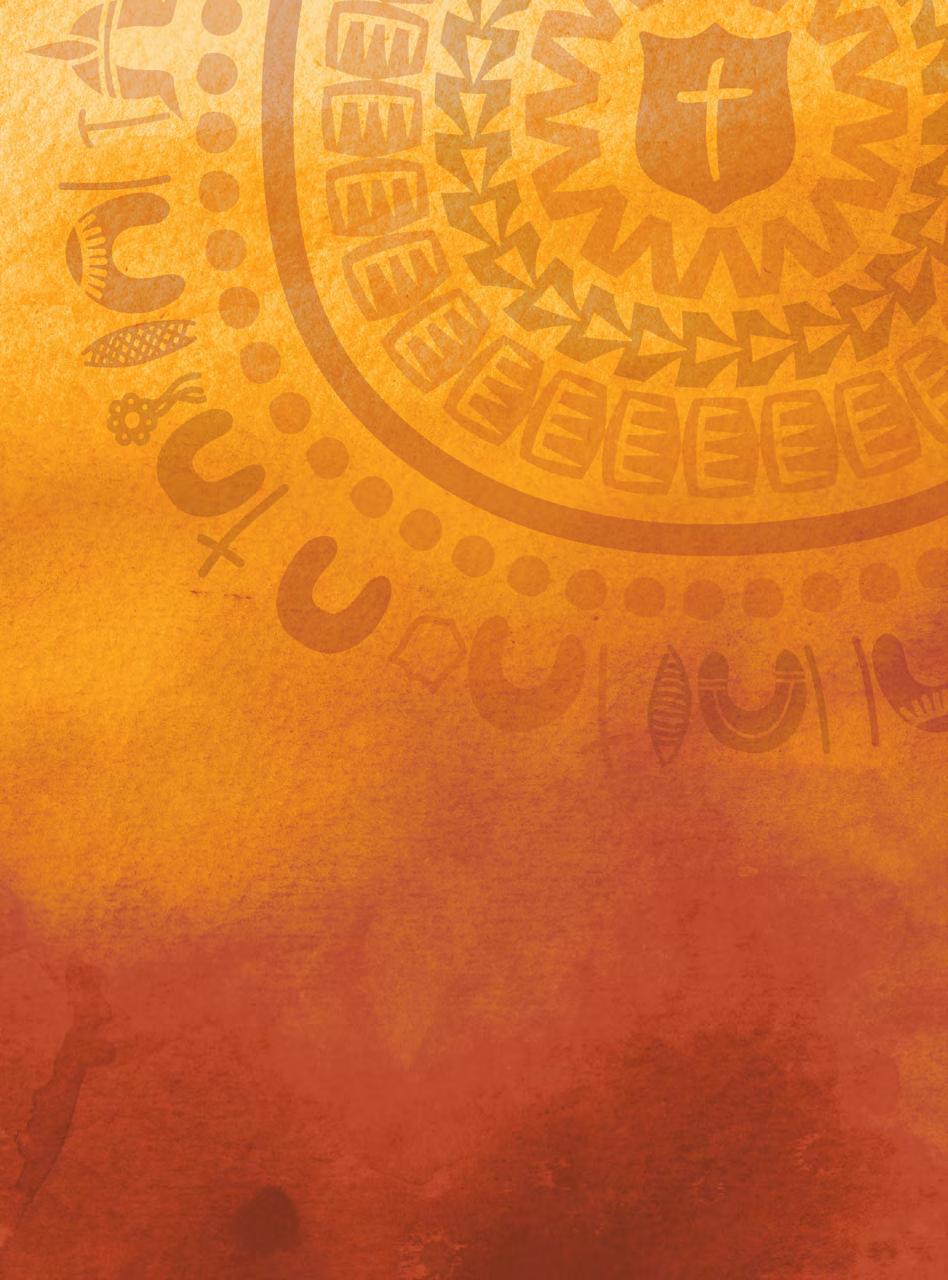
It has also allowed us to better support our growing First Nations personnel by the creating of the Burra Burra network where a quarterly check in with each other occurs.
Due to embedding these standards we have:
• had a 40 per cent retainment increase of First Nations staff
• seen the increase of an estimated 10,000 First Nations families participating in the Christmas Cheer initiative program
Our key commitment of TSA’s Innovate RAP was truth telling. We have used this time to research and develop a framework to begin to unpack our shared history within the communities we work in.
“Next is truth-telling, repair and justice,” Lucy explains. “We have to go on this scary journey of truth-telling about where our footprint has been as a Christian movement. We have to start engaging in those yarns, to accept it and work together to rectify the situation we’ve been a part of.”
“The Salvation Army’s vision for reconciliation is to be a faith movement committed to social justice, equity and freedom.”
The Salvation Army’s vision for reconciliation is to be a faith movement committed to social justice, equity and freedom. The Salvation Army seeks God’s direction in moving forward, in reconciliation, relationship building, and engagement.
“I prefer to look at Jesus moving from place to place,” Lucy says. “If that’s what it takes, to move our way through and empower local voices, then that’s what it takes. We need to be the doers and goers in the background, empowering local voices, who are the experts on their community.”
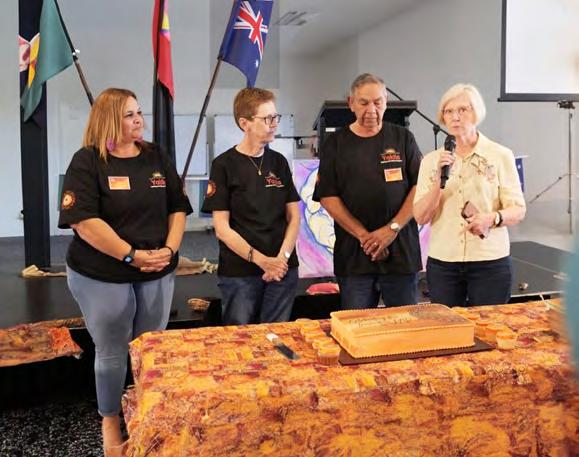

The Eva Burrows Award is a prestigious award that recognises an individual’s outstanding contributions and extraordinary service to The Salvation Army in the Australian community. The award is given in the name of General Eva Burrows AC OF* 1929-2015.
Eva Burrows (pictured) is only the second Australian to be elected as General of The Salvation Army, a position she held from 1986 to 1993. She was also the second woman to serve in this role, after the Founder’s daughter Evangeline Booth.
During her seven years as the leader of The Salvation Army, she proved highly effective, directing operations in some 90 countries and reawakening the Army’s founding spirit of evangelism in Australia and throughout the world.
General Burrows was a strong and effective administrator, but it was her warmth, wit and passion while in office and in her retirement that earned her the popular title of ‘The People’s General’.
The winners of this award are:
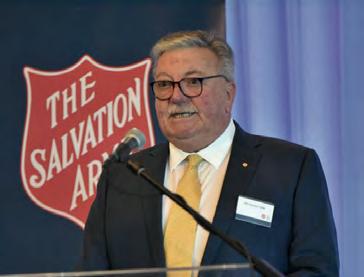

She was a capable and wise human being, whose life has made a genuine difference to the lives of people across the world. This award is given in her name, honouring individuals who make a genuine difference to the lives of Australians.
Mr Bill Dowson OAM
For over 30 years, Bill supported the work of The Salvation Army in the Illawarra region. He has given over 20 years of service as the Illawarra Residential Red Shield Appeal Chairperson, as well as being a member of the Illawarra Advisory Council, Illawarra Red Shield Appeal Business Committee and Santafest Committee. It is estimated that over this time Bill assisted The Salvation Army to raise over $3 million for those in need. Bill has been a mentor to many committee members, officers and employees over this time and is a strong advocate for The Salvation Army within the Illawarra region. He has been called ‘Mr Service’ for what is an obvious compliment for his capacity to enthuse, motivate, organise, galvanise and excite others into committing to support the mission of The Salvation Army across the Illawarra region.
*AC – Companion of the Order of Australia, OF – Order of the Founder (highest honour of The Salvation Army)
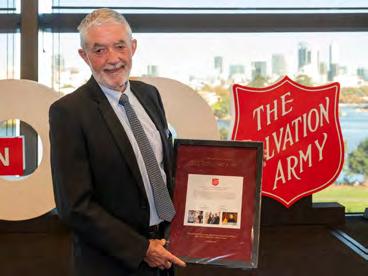
A highly respected business leader within the Geelong community, Mr Keith Fagg became an inaugural member of The Salvation Army’s Geelong Advisory Board when it commenced in 2001 and has served continuously with the organisation since that time. An indication of his dedication to this role is seen in the fact that Keith maintained his position on the Board while serving the wider local community for a period as the Mayor of Geelong. In 2013, Keith assumed the responsibilities of Chairman of the Board and has led with honour and distinction ever since. Throughout his tenure on the Board, Keith has been a friend, supporter, and advisor to The Salvation Army on many issues in the South West of Victoria. He has helped see us through some of the most important times of our recent history, including the transition from four Victorian Divisions to one State Command in 2017 and
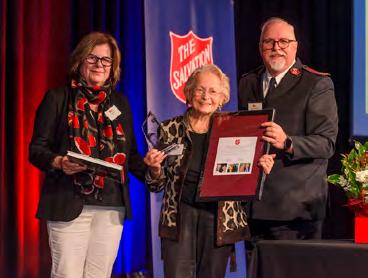
Since being admitted to practice in 1999, Keith has opened his door and heart to help many people whose circumstances do not allow them to have the legal support required in the field of family law. He has been available to support The Salvation Army and community, providing hundreds of pro-bono hours at Community Wills Days, attending presentations as well as personally assisting people in aged care facilities and by their hospital bed to ensure their wishes are fulfilled. Heading into retirement, Keith’s generosity will be missed but remembered. We thank Keith for his kindness, knowledge and for being an advocate for “The Sallys” mission and vision.
the amalgamation of the former Eastern and Southern Territories into the Australian Territory in 2018.

The generous support and unwavering trust of Shirley and John Uhrig has been transformational in their impact. For the past few years, this mighty philanthropic spirit has been shared by their children. In John and Shirley’s words: “The Salvation Army is always there, offering unconditional support without judgment.”
Mr Ralph Freckelton
Over the past decade, Ralph’s consistent support of The Salvation Army has helped assist Tasmanians experiencing homelessness and hardship. Ralph was instrumental in establishing the Salvos SleepOut in Hobart, through which close to $1 million has been raised for the Street to Home program.
Since the inaugural Salvos SleepOut in 2009, Ralph has hosted the event at the Hotel Grand Chancellor Hobart and used his strong business network to increase participation and support for the event, all in the effort to help people experiencing homelessness in the community. Through his involvement with The Salvation Army’s Business and Philanthropic Committee, Ralph has also helped increase awareness and support for key social issues, fundraising appeals, and Salvation Army programs across the state.
Ralph, and the staff of the Hotel Grand Chancellor Hobart, continue to be a key partner in the Red Shield


Appeal Business Breakfast and have supported the event’s significant growth in recent years.
Ralph’s contribution has made a significant impact for many Tasmanians.

In the late 2000s, Wide Bay Capricorn Building Society (now known as Auswide Bank) Managing Director Ron Hancock gathered a small number of like-minded business influencers in Bundaberg to establish a fundraising breakfast for their local Salvation Army. Ron built up the event to become a prominent fundraising event on the Bundaberg calendar. Over the years the event has developed into the iconic Red Shield Appeal Friday luncheon, regularly drawing a 200-strong capacity crowd of business heavyweights who passionately support those in need in their local community, through the work of The Salvation Army.
Ron’s vision and influence was immense and has been instrumental in raising over $1million during this period. Supported along the way by his late wife Lorraine, the legacy of Ron and his family continues through Dale Hancock, who remains as Chair of the Bundaberg Red Shield Appeal Committee and continues to grow the event from strength to strength.
The Others Award honours an organisation, trust or foundation’s extraordinary spirit of service to ‘others’ and outstanding contributions and support of the work of The Salvation Army in the Australian community.
This year the award has been presented to the following:
TechnologyOne Limited has supported The Salvation Army for 20 years through a partnership specifically focusing on improving educational outcomes for young people. Aligned to its core values, the TechnologyOne Foundation’s financial support has had a significant impact over these years, assisting the

For more than 19 years, Electel Resources and its Managing Director, Mark Gevers, has been a steadfast supporter of The Salvation Army. 2024 marks the third consecutive year that Electel Resources has partnered with the Salvos in South Australia as Major Sponsor of their Red Shield Appeal Launch event. This support has enabled our fundraising efforts to reach new heights and extended our corporate networks benefiting our work throughout the year. Hundreds of people have received care and support from the Salvos as a result of this commitment and generosity.
mission of The Salvation Army and our shared focus to make a difference to underprivileged at-risk youth in our community, empowering them to transform their lives and create their own pathways to success.
The Salvation Army’s Youth team has been the recipient of the Foundation’s pledge of supporting their community with profit, time and product. The Independent School at Lawnton (Qld) and Drive for Life program has experienced the generosity from volunteers and mentors from TechnologyOne, to support and guide students, enhancing educational outcomes via dedicated courses of self-awareness and development. This generosity is helping to shape and encourage the youth of today to attain great educational outcomes, life skills and independence that are instrumental to their success.
In 2023 alone, TechnologyOne staff engaged in over 500 volunteer hours at various Salvation Army locations, including our Salvos Stores Warehouse, Christmas Toy Warehouse and at a variety of local mission sites. TechnologyOne has also assisted The Salvation Army globally.

Canberra Centre has consistently gone above and beyond to make a positive impact by supporting the Salvos through various fundraising and engagement initiatives. One of the most notable contributions has been enabling and facilitating collection activities for the Salvos’ Canberra City Corps.
Alan Jessop OAM, a local Canberra Salvo and recipient of the 2022 Eva Burrows Award, collected donations at Canberra Centre (originally Monaro Mall) for over 30 years. It is estimated that Alan raised over $4 million, which is a testament to the importance of being in the city centre, prominently visible and accessible for people to lend their support.
For more than three decades, Canberra Centre has empowered vital fundraising through its generous provision of premium space, resources and promotional support. This has enabled The Salvation Army to continue vital services in areas such as homelessness, addiction, family and domestic violence,


unemployment, financial stress and natural disasters. Canberra Centre has also demonstrated its commitment by hosting events and appeals and showing unwavering support to those in need. This has made a tangible difference in countless lives, fostering a sense of community and compassion.

For 46 years, Bikers for Kids have held the Newcastle Toy Run, a beacon of hope for families in need at Christmas. Starting with just 20 bikes, it has grown into a monumental event, uniting over 10,000 riders from across Australia. This gathering showcases not only the vibrant motorcycle community but also collective goodwill.
The toy run isn’t just about fun; it’s a lifeline for struggling families. Through Bikers for Kids’ dedication, it has become a cornerstone of The Salvation Army’s Christmas efforts in the Hunter, contributing over $500,000 worth of toys and donations over three decades. This support brightens Christmas for families in hardship, embodying compassion and community spirit.
As Australia’s oldest event of its kind, the toy run continues to inspire, offering a sensory experience for all backgrounds. From engine roars to decorated motorcycles, it embodies Christmas giving, inviting the entire community to ensure no child misses out on the season’s joy.
›


The Theodore and Isabella Wearne Charitable Trust Incorporated (The Trust)
Theodore Wearne (1878-1969) expressed sympathy for the plight of the aged, orphaned and/or poor children, and people in need, living in Western Australia. In 1960, The Theodore and Isabella Wearne Charitable Trust Incorporated (The Trust) was established in Western Australia.
The Salvation Army acknowledges the work of the trust, which has made a difference in the lives of many thousands of men, women and children of all ages since their inception. The Salvation Army has been a grateful recipient of this generosity assisting in infrastructure projects and support programs across many years. The Theodore and Isabella Wearne Charitable Trust epitomises the ‘Others’ award and the underlying intent in relief of hardship and disadvantage.
“Collaboration refers to any joint activity by two or more parties for the purpose of linking or sharing information, resources, activities and capabilities to achieve aims that no single party could have achieved separately.”
~ Butcher, John R. and Gilchrist, David J. Collaboration for Impact: Lessons from the field. Canberra: ANU Press, 2020


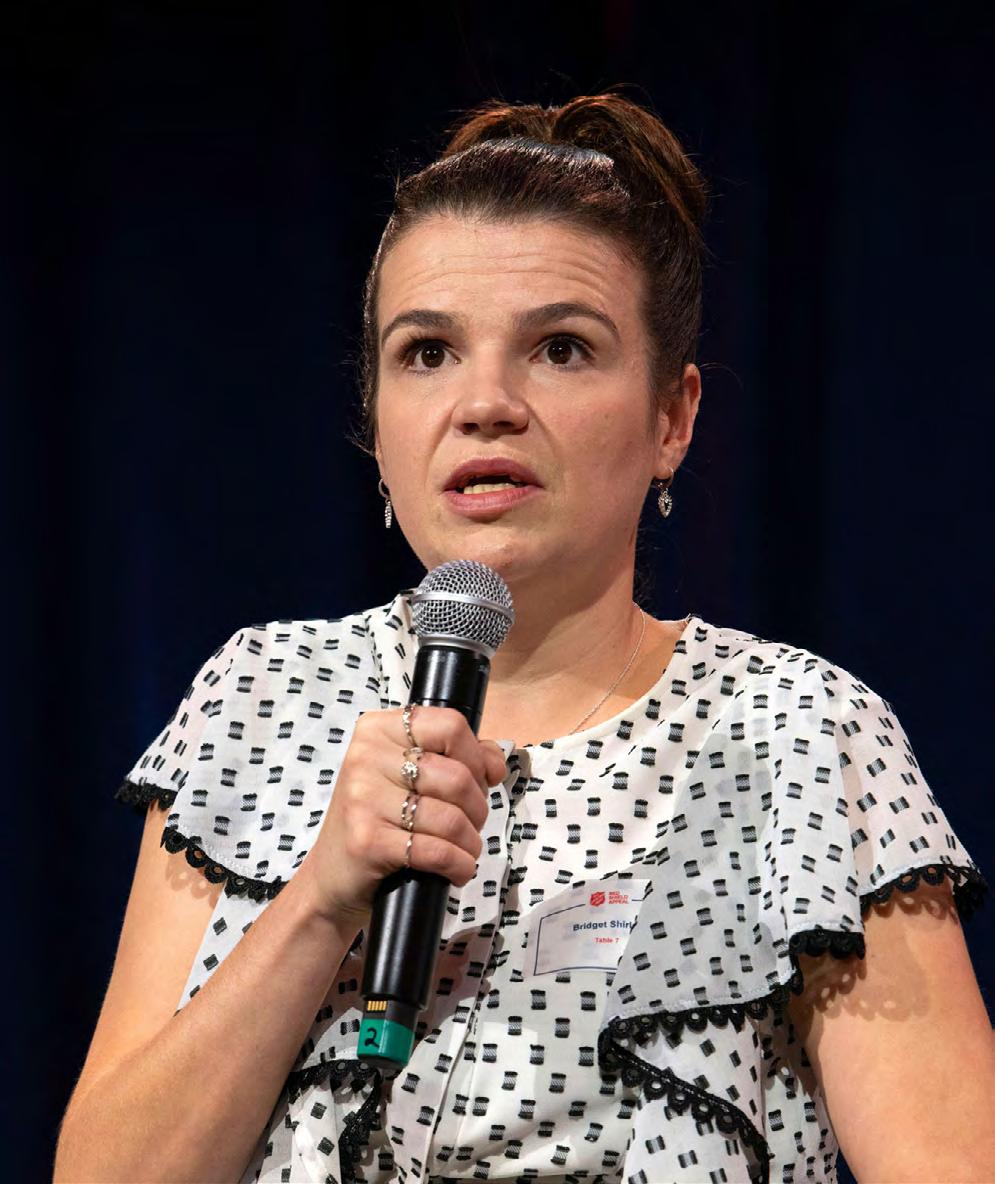

“Anorexia and addiction are wild and fierce animals, and they disrupt the lives of everyday families and everyday people – every day. They don’t discriminate.”
In a room of more than 500 people, you could hear the proverbial pin drop as a remarkable young woman, Bridget Shirley, shared her journey through anorexia, addiction, mental ill-health and homelessness at the Brisbane launch of the Red Shield Appeal this year.
Bridget, supported by her mum, Melinda Edwards, and Bill Hunter, leader of the Salvos God’s Sports Arena church, shared some of the darkest moments of her life and how the love of family and friends, connection, and God, her “higher power”, have brought her to a place of hope and a future.
“People talk about hitting rock bottom, but I’m one of those people that have to go to rock bottom and then find a basement and then find a closeddown railway and then the remains of an ancient civilisation before I might take one of the hands that’s at least been reaching out to me,” she shared. “I don’t do anything in half measures, that’s for sure.”
After a series of rehabilitation centres, psychiatric facilities and attempts to break the cycle, Bridget experienced yet another relapse in March 2022, ended up in hospital, and her family was called in to say their farewells. After pulling through that terrifying experience, Bridget made the personal and life-changing decision to ask for help.
She went through detox and graduated from the 12-week rehabilitation program at Moonyah – The Salvation Army’s Brisbane Recovery Services, and found acceptance, encouragement and an extended family at God’s Sports Arena. She is now 15 months sober, has completed qualifications in community services, and is looking forward to a hopeful and faith-filled future.
“A miracle happened, and this beautiful young woman is now back in my life, she has a future, and she loves life,” said Melinda, Bridget’s mum, who now volunteers for the Salvos and continues her unconditional support for her daughter.
“I started this as a conscientious type, a perfectionist, control freak lawyer – it was a wild journey,” Melinda continued. “Anorexia and addiction are wild and fierce animals, and they disrupt the lives of everyday families and everyday people – every day. They don’t discriminate. You cannot run. I tried that. You cannot hide. I tried that, and no matter how hard you try to fight you eventually are beaten into submission. But I sit before you today, incredibly grateful and the happiest I have ever been.
“A huge shout-out to every single person in this room who is associated with The Salvation Army … I have my miracle, and that’s why I’ll turn up at God’s Sports Arena every Sunday and at the Streetlevel Mission on Thursday nights, and I’ll make sandwiches and I’ll make coffees and I’ll give hugs because every single person in that room is somebody else’s son or daughter.”


The Red Shield Appeal is The Salvation Army’s key fundraising activity and this year we celebrated a milestone – 60 years of the Red Shield Appeal weekend.
Since 1964, the generosity of supporters and donors has been providing hope for Australians experiencing hardship and crisis. Donations made to the appeal provide vitally needed financial support for services and programs, enabling The Salvation Army to deliver on its mission across local communities, cities, suburbs, and rural towns throughout Australia.
During the 2024 Red Shield Appeal campaign, we shared the stories of three Australian families who experienced homelessness due to the housing crisis. Cost-of-living pressures are impacting many Australian households and in the current economic climate, more Australians are experiencing financial stress and hardship. In response, we set an ambitious Red Shield Appeal target of $38 million. We asked all Australians to donate to help individuals and families who have fallen on hard times get back on their feet in affordable homes, giving families the new beginnings they need.
We know that Aussies are facing tremendous pressures to their household budgets, and that the economic situation isn’t as optimistic as it had been. So, we want to acknowledge your generosity and willingness to support us to make a huge difference in the lives of others. Your caring heart and generous giving enable lives to be transformed.
Last year alone, because of your support we were able to distribute nearly $25 million in financial support and assist over 250,000 people across all our social programs. Nearly 320,000 sessions of care were provided to people who were at risk of or experienced homelessness, and 123,000+ nights of emergency accommodation were provided for those impacted by violence.
Thanks to our generous donors and supporters this year the Red Shield Appeal raised $41 million to provide support and care to people in need. Your support of the Red Shield Appeal provides the necessary resources to enable us to continue meeting vulnerable people at their point of need and providing life-changing care to those who seek the Salvos every day for assistance. Your support of the appeal can ensure those in need get not just immediate help, but also long-term solutions.
Together, we will bring hope to many people, make a positive and impactful difference in their lives and create long-term change to help shape a brighter future for disadvantaged and vulnerable Australians.
Over 3,000 people attended Red Shield Appeal events across Australia
Over $5 million raised by volunteer fundraisers in their local communities
Over $400,000 was raised by Salvos Stores’ generous customers
60-year volunteers
Across 25-26 May, we celebrated the 60th year of the Red Shield Appeal weekend. The community support was incredible. We’d like to extend our heartfelt gratitude to all our supporters and volunteers who have made this milestone possible. A very special thank-you to our 60-year volunteers! Hundreds of Red Shield Appeal volunteers were honoured with a commemorative pin to honour six decades of unwavering service and commitment to our mission. Thank you to everyone who raised and contributed vital funds for the Red Shield Appeal this year.
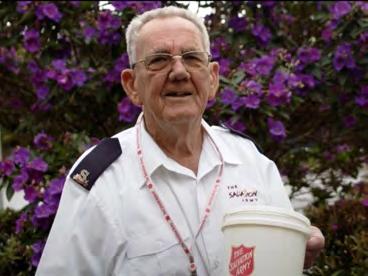
We’d like to say a special thank-you to our Red Shield Appeal Platinum Partners, Crown Resorts Foundation, Myer and Mercer, who contributed to the Matched Giving Fund of $1,506,700! Their support counted for double the impact over our Match Giving weekend! Thank you all for your exceptional support – your support is invaluable!
“Crown are incredibly proud to be supporting The Salvation Army’s 60th Red Shield Appeal and helping communities who are doing it tough. Thank you to our guests and team members who united with us in extending hope and assistance to vulnerable Australians.”
~ Ciarán Carruthers, Crown Resorts CEO.
“It’s with great pleasure to once again be partnering with The Salvation Army for this year’s Red Shield Appeal. We are extremely proud to work alongside The Salvation Army to bring hope to individuals and families in need.”
~ Cathy Hales, CEO, Wealth, Mercer, Pacific
or scan to view
“We are extremely delighted to work alongside The Salvation Army and amplify the impact of the Red Shield Appeal donations, doubling efforts to uplift communities and drive positive change.”
~ Lucy Hobson, Community Relations Advisor Myer Community Fund.
In celebration of our 60th Red Shield Appeal, a number of landmarks and sites were lit up red across the nation.
These included:
• Transurban lighting up the Bolte Bridge in Melbourne and the Sir Leo Hielscher Bridges in Brisbane
• Crown Resorts lighting up their buildings in Sydney, Melbourne and Perth
• The Royal Australian Mint, Old Parliament House and Telstra Tower in Canberra






We want to say a huge thank-you to all who showed their support of The Salvation Army through this exciting initiative.
“HopgoodGanim Lawyers is committed to giving back to the communities we serve as a law firm through philanthropy and our pro-bono impact strategy, and recognise the importance of the vital work The Salvation Army does to help so many people in need.
We have been a long-term supporter of the Salvos for more than 20 years and the principal sponsor of the Red Shield Appeal Launch for over a decade, and our team are grateful to help in a small way, in contributing to the Salvos’ vital work and efforts improving the lives of everyday Queenslanders.”
~ Mr Luke Mountford – Managing Partner, HopgoodGanim Lawyers
“Once again, the team here at Electel cannot be more supportive of the committed and selfless work of the Salvation Army. As we hear stories daily of our fellow Australians doing it tough in all manner of ways, we are proud to partner with the Salvos through the Red Shield Appeal to help those in need of a helping hand.”
~ Mark Gevers, Managing Director, Electel Resources Pty Ltd
I can’t thank you enough for your continuing belief in our mission. You are part of a community united by faith, love and a determination to help fellow Australians in times of need.
The cost-of-living crisis combined with soaring rents has pushed increasing numbers of Australians into severe hardship and, in many cases, homelessness. In the first two months of this year, we saw a 25 per cent rise in the number of people we assisted compared to the same time last year. This is the worst housing situation we have experienced in a very long time, so we truly appreciate your continuing support. Your giving heart helps struggling Australians turn their situation around and find a way forward – it has the power to change lives and transform communities.
The Salvation Army remains committed to supporting individuals, families and communities across Australia who face significant disadvantage. We will continue to walk alongside people to empower them to thrive and make a positive and impactful difference in their lives.
Your kindness and generosity have rarely been more needed than they are right now – so thank you.
God bless you,
Colonel Rodney Walters Secretary for Communications The Salvation
Army Australia

We are forever grateful for the generous donations given to The Salvation Army to support our work. The following stories are examples of how Red Shield funds have been used to support services and programs that make a positive difference to the lives of many Australians.
A pioneering Women’s Shed program is breaking new ground at Bendigo Corps’ Community Services, causing much excitement amongst the local community.
The program, aimed at local women to enjoy the art of woodworking in a workshop group setting, plus be a focal point for social connection, has fulfilled a long-term vision for the community hub.
Belinda Smith, Community Services Manager, said the local community had asked her to establish a women’s workshop group for quite some time, but funding or the capacity to cater for such a group had not been available. However, thanks to funding from The Salvation Army, the ‘Women’s Shed’ program has now come to fruition, with women meeting every Thursday morning to be part of the
Red Shield funds bring mission and community together in Wollongong
A Red Shield initiative kids’ school holiday program at Wollongong Corps (NSW) recently illustrated how Local Mission Delivery (LMD) can wrap community connection around Salvation Army service delivery.
A Wollongong Corps kids’ camp was an idea born from an LMD planning day held a few years ago when Lieutenant-Colonel Lyn Edge was first appointed to the corps on the NSW South Coast.
The first Wollongong Corps holiday program, funded by the Red Shield Appeal Initiative, was held in 2023 and was a huge success.
This year, the team built on what they had learned from 2023. “It was fantastic,” said Lyn. “The holiday program was staffed with leaders and people from the corps with the support of another church in our local area – we had helpers from age 16 through to age 80!
Lyn said that the beautiful thing about the initiative
workshop group and learn woodworking skills.
Belinda said some of the ladies she had spoken to wanted to learn how to use a woodworking tool, and the Women’s Shed enabled them to learn new skills.
“They have got to the point where they are sick of relying on others to do something simple around the place,” Belinda said.
Fellowship is a key element for the Women’s Shed program, especially for some ladies involved with the TDR group (drug and alcohol rehab group) who are now starting to get involved with the workshop group to learn new skills. The shed has met a critical need in the community.
“Without the Salvos providing and opening up the money to provide the women’s workshop group through Red Shield Appeal funding, we would not be able to run it,” Belinda said.
was seeing how corps-based LMD events wrap around Salvation Army services such as Doorways and the local Illawarra Carinya Women’s Services, which provides accommodation and support for women and children experiencing homelessness and/or family and domestic violence.
Lyn says that Wollongong Corps is using Red Shield Appeal funds to “amplify” the amazing work of existing Salvation Army services in the Illawarra, which aims to love and care for whole families for the long haul.


It’s a weekly ritual that some people simply could not do without. With shopping bags under their arms and hearts full of hope, local community members congregate around Werribee’s train station bus terminal late on a Friday afternoon, anxiously awaiting the arrival of The Salvation Army Wyndham’s shiny red Hunger Buster bus and its amazing volunteer team.
Its arrival around 5pm is a cause of much relief, providing fresh food, cooking up a barbeque and serving hot drinks to provide essential support to those in need. For many, it’s a lifesaver – a chance to quell the hunger pains.
“I simply do not have enough money to buy food,” says one gentleman waiting to be served.
“I have had to steal some food from supermarkets at times, which I don’t like doing and am ashamed to do because it’s not right, so I can eat. Coming here just helps me so much, and that someone asks me how I am doing and is interested in me.”
Another lady holding a much-loved sausage and bread in hand says the hot barbeque provided by the bus outreach ministry is the highlight of her week. “It’s the only hot food I have during the week,” she
said. “I am so very grateful they supply this to the community.”
Personal stories of hardship, loneliness and isolation are often heard and while the numbers have increased, so has the team’s determination to continue pouring hope, friendship and a listening ear into all those they meet, treating everyone with dignity and respect no matter their circumstances.
Red Shield funding is used towards the operation of the big red bus with the ministry also having the support of key donors – Second Bite and 7-Eleven Australia – which continually provide food from fresh fruit and vegetables to pre-prepared wraps and sandwiches.
“We envision the bus to be the first point of contact for people, to give them the food parcel, fill their tummy, and to know they are loved and cared for and to follow them through. But we are also seeing lives transformed from the outreach ministry,” Wyndham Salvos Ministry Assistant Tim Kite says.
“By us rocking up with a big red bus, it’s that flame of hope that life will get better. Without hope, people don’t envision change and that better days are ahead. I hope that’s what people see at the bus – a cup of water, a hot meal, a hug.”
Click or scan to read the full version of Jose’s story at salvosonline.org.au/post/ meaningless-becomesmeaningful-for-jose
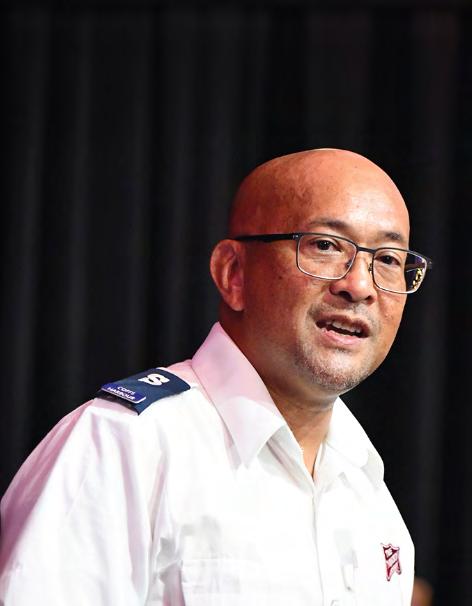

“The Salvation Army became an important part of my life.”
I was born and raised in Cebu, Philippines, the eldest in a family of four kids. My dad died when I was 15 and two years later my entire family – my mother, my siblings and I – migrated to Australia.
After completing Year 12, I joined the workforce to help my mum support my younger siblings. I landed my first job with the Reserve Bank of Australia in 1990, then went on to work for AMP Investments and Perpetual Investments until the early 2000s.
In 2003, I had an experience that changed the trajectory of my life in ways that I never dreamt of. One Sunday afternoon, a very good friend of mine invited me to his house to watch Sunday football. He pulled out a glass pipe and a clear plastic bag with a crystal substance. It was a substance I came to know and fall in love with – ICE, aka crystal methamphetamine.
The moment I tried ICE, I felt on top of the world, and I was hooked. Suddenly, I had confidence. But, more importantly, it numbed the pain of the grief I was feeling about the loss of someone close to me. The downside is that ICE stops you from sleeping. Sometimes, I didn’t sleep for days.
At first, there was a daily choice about whether to take ICE, but the addiction rapidly took hold of my life, and it became a matter of when, not if Within six months, I was spending $1000 a week on my habit. I lost my job. I got evicted because I could not pay my rent. My car was repossessed. I had to move back to my mum’s house. I racked up credit card debt to fund the addiction. I started to break into my brother’s home to steal stuff to pay for the drugs. Eventually, my mum kicked me out, and I became alienated from my family.
I turned to crime to support my habit, from theft to fraud. I shoplifted, I stole mail, I stole credit cards.
After being arrested yet again for possession in 2015,
I was released from prison with a one-way ticket to Coffs Harbour to attend a rehabilitation centre. I was also given a black garbage bag of donated clothes that were three sizes too big.
I was walking through Sydney Airport when I experienced my first spiritual awakening. I looked at everyone else with their luggage, and they were happy. Then I saw my life as it really was, and not the delusion in my head. I was 45 years old, and the sum total of my life was a black garbage bag, the contents of which did not belong to me.
It was the reality check I needed. I smashed my phone to eliminate the temptation of getting in touch with any dealers or former connections and spent 11 months in that treatment centre. It was Adele House, a treatment centre managed by The Salvation Army. The program allowed me to develop new patterns of living, create smart goals, to budget, cook and learn new skills. There was group and individual therapy that facilitated emotional healing.
One day at a time, I got clean. In that rehab, The Salvation Army became an important part of my life. Once out in the world again, I accessed wraparound services that created a pathway to new living. Most significant of all was The Salvation Army. The people there lived, loved and fought alongside me in the early days when I couldn’t live, love and fight myself.
Today, I am eight years sober. The Salvos aided my journey in every way, and Coffs Harbour Salvation Army became my spiritual home. I graduated with a degree two years ago, and I am halfway through a Bachelor of Ministry.
My mission field today is with the Australian Anti-Ice Campaign. We provide peer support work and specific anti-ice education workshops in schools as well as in Juvenile Justice Centres throughout Australia. We do this in partnership with the Salvos.
I live a very busy life today. I have a job, I visit prisons, I run workshops in high schools and juvenile justice centres, I have a Salvation Army church ministry, and hold roles on various association and not-for-profit boards.
A watershed moment for me was late last year – I got accepted as a cadet-in-appointment with The Salvation Army. In other words, to be a Salvation Army officer and work full-time in ministry.

From emergency response to recovery, we stand with communities for the long haul, providing financial, material, emotional and spiritual support so lives can be re-established after disaster.
In the aftermath of a disaster, it’s easy to feel overwhelmed by the enormity of what needs to be done. You don’t have to take that journey alone. The Salvation Army is available to provide advice and clarity, to make sense of what the next steps are and to help you regain some control over the situation. The Salvos are here to support you for as long as it takes to recover.
When Cyclone Jasper and severe storms impacted parts of Far North Queensland less than a fortnight from Christmas 2023, they caused widespread devastation, loss and uncertainty. Cooktown was one of the locations cut off by destruction and floods. Despite this, The Salvation Army Emergency Services (SAES) team, led by Major Lincoln Stevens, together with the help of the military deployed to the town, provided 7486 meals, snacks and refreshments for evacuees and first responders in evacuation centres When the SAES teams were activated, 360 community members needed food, shelter and support. Trucks couldn’t get through to the town with essential supplies.
Lincoln, SAES Response Coordinator – North Queensland, already had a truck loaded with supplies in Cairns. He worked with police and the Queensland State Disaster Coordination Centre in Brisbane to have the heavy-lift Chinook helicopters deliver the goods to Cooktown.
““To their great credit, our partner, Woolworths, had
guys working overnight in Townsville to pack up chilled and dry foods – 14 pallets,” said Lincoln. “Their truck took it to Cairns airport. The Chinooks flew to Cairns, picked up the rest of the catering equipment and then delivered a total of 19 pallets to Cooktown.”
Major Ben Johnson, Cairns Corps Officer, led the corps’ response to the cyclone and floods in Far North Queensland, in conjunction with the Human and Social sub-committee formed by local council.
“Our staff and volunteers have been incredible and inspiring in action and in spirit,” Ben said. “We are doing whatever is needed, such as providing food at the evacuation centre, processing toys for Christmas, doing welfare checks on people affected by the cyclone, putting together hampers for those in need and working with our family stores to get household supplies.”
The SAES Response and Recovery teams (including surge personnel) were privileged to support thousands of people and grateful for the generosity of the Queensland Government, our supporters and partners.
An unprecedented blackout was caused by a tornado on Christmas night, which ripped through the Gold Coast, Scenic Rim and Logan City with winds of 150km/h. Huge trees were uprooted, power poles and lines ripped out, and houses and businesses impacted with minor to severe damage. Tragically, lives had also been lost.
Intense and prolonged local rainfall and further storms continued to pound the region over the New Year period, causing flash and major flooding. A mini heatwave also hit the area in the days after Christmas, while many areas were without power. More than 10 recovery hubs were opened by the government in response.
“On 2 January we had 10 of our people onsite at Upper Coomera,” said Major Sue Hopper, SAES National Program Manager, who was working at the hub for four days. “This is almost unheard of, but apart from Jimboomba, all other sites were closed due to flooding.
“We did 140 assessments in one day at Upper Coomera alone. There were so many families to see –mostly families who’d had no power since Christmas, large families who have lost everything and whose homes are damaged from the storms and rains. It’s devastating to people, and when they are already in tough situations and something like this happens, it becomes catastrophic for them.”
Our response in Far North and South East Queensland: $2.07 million+ distributed in financial assistance
18,658 people across 7319 households assisted
“We are a family on the northern Gold Coast that lost power and our water supply during the recent storm. There was also damage to our trees. We applied for relief from The Salvation Army at the Coomera Community Hub and received a generous gift voucher - such a relief at what has been an expensive time with all the unexpected costs as well. We just wanted to thank the organisation for the generous support of the community in a time of need. A special thank you to the people at the pop-up tables in the Coomera centre who did their best to serve all who came and showed kindness and caring even under pressure. We are so grateful for your services and will show our support in return when the time comes.”
~ Suni, from South East Queensland.

As bushfires burned in Victoria’s north and west, Salvation Army teams assisted emergency services crews and those affected by the crisis. Central Victoria Salvos Team Leader Captain Ronald Stobie and his team operated the Maryborough Relief Centre when bushfires threatened homes and caused evacuations in the state’s north-west.
Ronald said at the time of the bushfires, “The team is doing quite well; they have been astounding in jumping in and lending a hand,” adding that The Salvation Army’s presence from day one has been showing the love of God in action: “Many of our team are people of faith and are connected in that way and we can show that this is why we’re here, this is what we believe in
– we believe in good. So, we want to do what we can to support our community.”
In addition to the Grampian bushfires, the SAES teams also supported first responders and community members impacted in January by floods in Bendigo, Echuca, Seymour, Murchison and Rochester.
Over 80 SAES members provided:
625+ volunteer hours worked
2500+ meals and refreshments served at evacuation centres
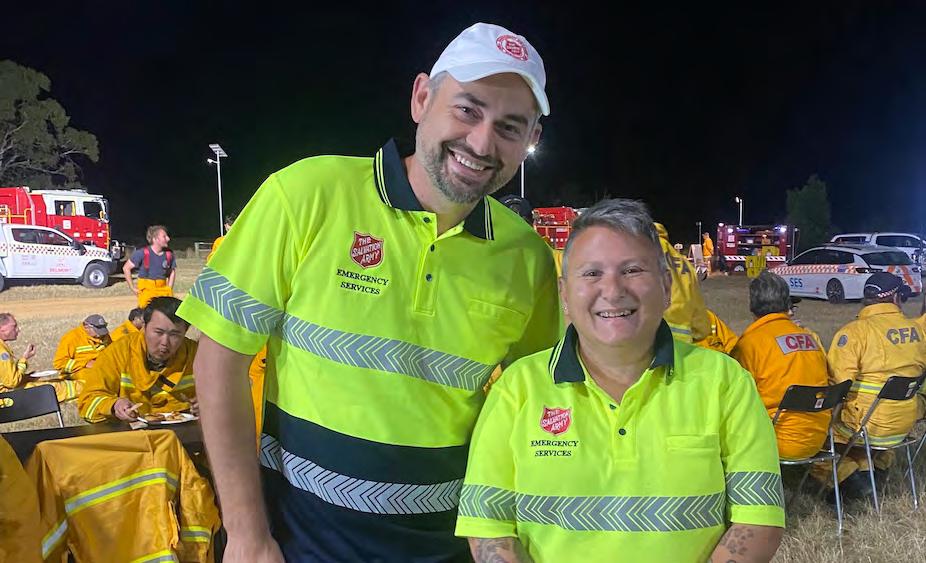

› “Bunnings provided their staff to support on almost every shift over five days to prepare meals and refreshments for fire fighters working on the frontline. We even had a separate team of Bunnings volunteers assisting at our depot to help prepare meals, wash trucks and cook meals to support teams on the ground. We are so thankful to Bunnings for their ongoing support,” said Benjamin Day, WA SAES Response Coordinator.
When a series of large bushfires hit parts of Western Australia in October 2023, SAES Coordinator for WA, Benjamin Day, put the call out across the country for experienced support.
Two people who put their hands up straight away were SAES volunteers Gavin and Linda from NSW. They jumped on a plane at short notice to assist Salvation Army Emergency Services crews in WA.
“Gavin and Linda assisted for a number of days supporting the Wanneroo bushfire incident before leading up the team to feed the families who had been evacuated to the Bullsbrook Recovery Centre,” Benjamin said.
As part of the SAES recovery effort for the Wanneroo and Mariginiup fires:
56 households and 153 people were assisted
$60,500+ distributed in grants
299+ volunteer hours worked across 58 volunteer shifts
In the bustling world of nonprofits, where compassion meets action, The Salvation Army stands as a beacon of hope. Its mission to serve the vulnerable, uplift communities and provide essential services relies not only on dedicated staff but also on the collective power of volunteers. Among these unsung heroes are corporate volunteers, whose commitment and teamwork exemplify the adage, ‘Many hands make light work.’
With Salvation Army centres abuzz with activity, tasks abound: boxes need packing, meals require assembling and logistics demand management. We are sincerely grateful to our tremendous corporate volunteers. Their sheer numbers allow for swift completion of essential tasks, ensuring that food reaches those in need promptly. Whether sorting clothing donations, organising Christmas toy drives or cosmetically enhancing our centres, their collective effort multiplies impact.
With The Salvation Army’s work spanning a wide spectrum, from feeding the hungry and sheltering the homeless to disaster relief and rehabilitation programs corporate volunteers bring fresh perspectives and diverse skill sets to the table. Their involvement extends beyond financial contributions; rolling up their sleeves, standing side by side and making a tangible impact.
Each year, The Salvation Army provides over 2000 opportunities for groups of corporate employees to unite and serve their communities. The transformation on both sides is nothing short of amazing and we express sincere gratitude to all our corporate partners who provide employees with the opportunity to serve alongside the Salvos.
NAB Foundation: Understanding impact requires resources
Understanding the benefit of corporate volunteering and recognising the critical role of volunteer coordination to efficiently manage requests from our strategic partners, the NAB Foundation has generously contributed towards securing a permanent resource to enable The Salvation Army to further expand its capabilities in delivering corporate volunteering opportunities.
Each week, our friends at NAB enable their employees to come together to support The Salvation Army’s mission. The mutual benefits and teambuilding opportunities are very special to witness, leaving everyone with hearts filled, knowing their contributions make a difference in the lives of others.
If your organisation would like to learn more about corporate volunteering, please go to this link: salvationarmy.org.au/getinvolved/corporate-support/ corporate-partnerships .
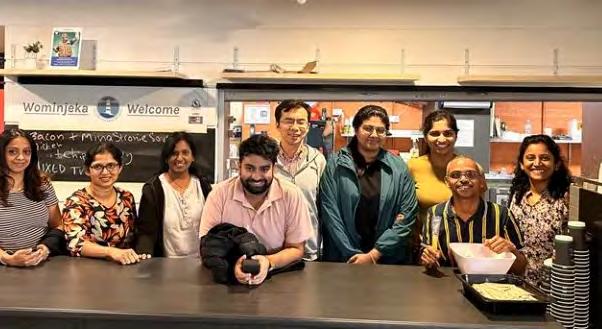
“We are delighted to support the Salvos with essential resources that further enable the corporate sector to get involved in the community. Volunteering is more than serving meals or sorting through donations, it brings teams together to create a deeper bond and sense of purpose that is both rewarding and humbling. It’s an experience that enables staff to gain a greater understanding of the importance of how every bit of support really does make a difference. NAB Foundation’s support empowers even more corporate volunteers to turn compassion into action, for the greater good.”
~ Kate Betts, NAB Foundation
“It was an absolute eye opener for me to see how The Salvation Army is looking after people and servicing their basic needs. We were greeted with smiles and were appreciated by diners for treating them with care and serving them food. I came out of this volunteering realising how grateful we are to have the basics in life when so many are struggling to even get food.”
~ NAB Employee
Christmas is traditionally the time of giving and a time to remember and celebrate the birth of Jesus Christ. It should be and can be a wonderful time, but sadly it’s a time when vulnerable Australians really feel the pressure of living costs.
The Salvation Army’s services have witnessed significant increases for support at Christmas, with families and individuals severely impacted financially after expenses such as basic grocery staples and fuel. And when a tragedy or crisis hits it can be terribly hard. Children, people struggling alone and families battling to keep food on the table are the hardest hit.
Last Christmas with the support of our generous donors and corporate partners, The Salvation Army Christmas Appeal raised $25.9 million. You helped us provide practical support in the form of hampers, food vouchers, Christmas presents for children who otherwise would have none and financial assistance to help families pay bills.
We are so grateful for your support and generous contribution that helps so many Australians celebrate the joy of Christmas and experience the gift of hope.
The impact of your Christmas support:
More than 13,500 food hampers distributed
Over 250,000 gifts provided for individuals and families accessing our services
More than $1.7 million provided in financial assistance through our services and programs
Provided 131,000 sessions of care

Click or scan to view the video of The Salvation Army Christmas Appeal 2023
We are so grateful to our partners AGL, Alinta Energy, Origin and Woodside Energy for continuing to support our Light the Way initiative again last Christmas. Hundreds of families and individuals impacted by cost-of-living pressures, especially over Christmas, received support for household bills, emergency accommodation, food hampers, medical costs and financial counselling thanks to their generous contributions. Thank you for standing alongside us in our mission to assist everyday Australians.
“AGL is very pleased to partner with The Salvation Army this year again. They light the way with their incredible work within the community every day, bringing hope and joy to all those who need it from all walks of life.”
~ Armineh Mardirossian Head of Social Impact, AGL
“At Alinta Energy we’re really grateful to the Salvos for all of the fantastic work they do out there in the community and for that reason we’re delighted to support the Light the Way campaign again this year.”
~ Mike Seales
General Manager Safety and Sustainability, Alinta Energy

“At Origin Energy we’re part of the community and we’re here to help and that’s why we’re proud to be supporting The Salvation Army’s Christmas campaign again this year where we can alleviate some financial stress from people who need it the most.”
~ Melissa Homes-Allen, Customer Advocacy, Origin Energy
“At Woodside Energy we’re proud to be supporting The Salvation Army’s Light the Way campaign to help give hope to those facing hardship and crisis. ‘We Care’ is one of Woodside’s values and we’re grateful for the amazing support The Salvation Army provides to our communities.”
~ Tony Cudmore
Executive Vice President Strategy and Climate, Woodside Energy
“We feel privileged to be able to help make the lives of Australia’s most vulnerable children and families a little brighter. Through our charitable Christmas campaign activities, which includes the MYER Charity Bear, Kids Day Out and Register Round Up campaign, we are proud of the partnership we hold with The Salvation Army and grateful to support the vital work the Salvos do in the community to assist Australians doing it tough.”
~ Olivia Wirth, Executive Chair, MYER

Since 1993, MYER has been a longstanding Christmas partner of The Salvation Army with over $10 million of support provided since the partnership began. MYER continues to bring Christmas cheer to many families including those experiencing family and domestic violence at Christmas.
MYER once again brought Christmas to life with their Charity Bear – Charlie. Proceeds from Charlie Bear, accompanying merchandise and Christmas register round-up campaign, have brought joy to many individuals and families at Christmas time and beyond.

In addition, Kids Day Out – a very special VIP Christmas event for children supported by our services – is also hosted by MYER and brings such joy

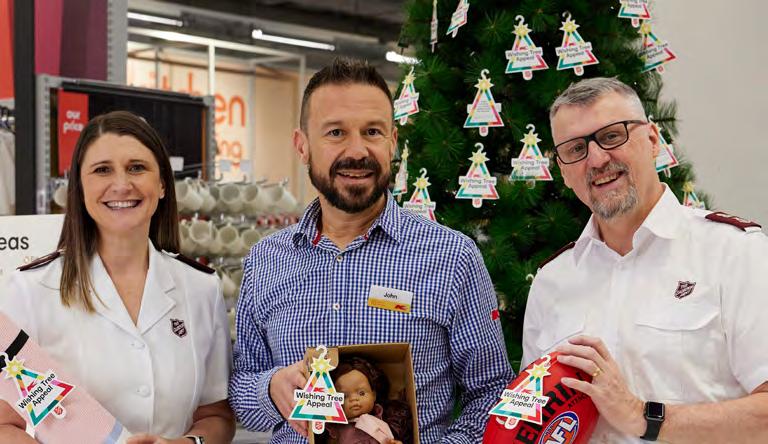
As the cost-of-living crisis crippled households across Australia we saw a steep rise in the number of families struggling with real hardship, spiralling debt and even homelessness – many for the first time in their lives. Once again, Kmart and The Salvation Army came together to spread hope.
Kmart customers have done Australia proud, with thousands of people across the community donating unwrapped gifts to the Kmart Wishing Tree Appeal and contributing financially. This resulted in a 30 per cent increase in gifts and an increase in financial donations from across Australia.
Thanks to the support of Kmart customers, team members and volunteers, we have been able to support thousands of struggling Aussie families and individuals across the country, easing the burden at Christmas and offering hope. The Kmart Wishing Tree Appeal is Australia’s largest and longest running gift collection drive and has collected and donated over 10 million gifts since its inception over 35 years ago. The funds raised will continue to help the community through 2024 and beyond.
“We know that the need across Australia has never been greater, which is why the Kmart Wishing Tree Appeal continues to be
such an important local initiative that gives customers and team members the chance to make a direct impact to those struggling the most in their community. We couldn’t be more grateful to our customers and corporate supporters for their continued generosity, as well as our team members who volunteer their time to bring the Appeal to life each year – all to help the Salvos to do such important work in the community.”
~ John Gualtieri, Chief Executive Officer, Kmart and Target Australia and New Zealand
The Salvation Army is grateful for the support of Coca-Cola, which donated 5000 meals towards our 100,000 Meals Campaign to directly support people in local communities across Australia during the Christmas holiday period. Whether it was families or friends doing it tough, anyone unable to prepare their own meal, or someone who was feeling extra lonely, community-meal events ran in the days leading up to Christmas and on Christmas Day. This partnership helped bring people together in a supportive and friendly environment to experience hope, joy and the magic of Christmas.
“Christmas can be a difficult time and this year places extra financial and emotional stress, particularly on families and our most vulnerable community members. Our Christmas campaign for this year, ‘The World Needs More Santas’ is all about finding your ‘inner Santa’ and sharing joy and kindness this festive season.
We’re proud to play our part in spreading joy this Christmas and encouraging kindness and connection by supporting the Salvos in their mission and contributing up to 5000 delicious meals to community members who need it.”

~ Kate Miller, Marketing Director
at Coca-Cola Australia

The Salvation Army and the Sydney Kings partnered for a second year in a row to create a brighter Christmas for Australians in need. The Christmas Day NBL match saw reigning champions Sydney Kings take on Illawarra Hawks at Qudos Bank Arena in Sydney. Sponsors Beyond Bank Australia, Kmart, Harvey Norman and Acorn Managed Investments all generously donated funds for each three-pointer scored on the night, raising much-needed funds for The Salvation Army to help Australian families doing it tough. The Salvation Army is so grateful for the incredible partnership with the Sydney Kings.
“Last year thousands of people in our community took the opportunity to celebrate Christmas in a new way, by connecting with their community through basketball. We look forward to building upon this new tradition with The Salvation Army as our partners.”
~ Paul Smith, Sydney Kings co-owner and chairman
› The Sydney King NBL team with Salvation Army mascot ‘Shieldy’.

The Crown Resorts Foundation and Crown Resorts has kindly supported the Salvos for over 17 years and last year sponsored The Salvation Army’s 100,000 Christmas Meals, donating $305,000 towards the initiative.
The Salvation Army is so thankful for the commitment of Crown. These contributions will be used to fund programs and services that address the immediate needs of individuals and families doing it tough, and bring joy to those who need it most.

“Life can be challenging for so many. We are constantly in awe of the compassion and care of our guests and team members at Crown, and these donations are excellent examples of that. It reminds us just how good it feels to give back.”
~ Kelly Townson, Crown Resorts Foundation Group General Manager

“This Christmas, our caring and compassionate community united to serve so many people who were struggling alone. We simply couldn’t help as many people as we do without your kind heart and loyal support.
On behalf of everyone at The Salvation Army, thank you for your continuing belief in our mission, we are fortunate indeed to have you walking with us in our daily work.”
~ Colonel Rodney Walters, Secretary for Communications The Salvation Army Australia
John and Shirley Uhrig are passionate and generous supporters of The Salvation Army. Their outstanding contribution and extraordinary service to The Salvation Army was recognised this year when they received the Eva Burrows Award. Shirley shares about their life and connection with The Salvation Army.
John and Shirley were both born in Newcastle, NSW. Shirley moved to Sydney to attend Sydney University and John completed a diploma in Metallurgy with BHP in Newcastle and went on to complete a Bachelor of Science from the University of New South Wales.
After completing her studies and becoming a pharmacist, Shirley returned to Newcastle. John had been overseas, and they met when he returned. They became engaged and bought a small pharmacy business with a loan guaranteed by Shirley’s father, which was successfully paid off by the business. They married in 1956 and their eldest son was born in 1958. When he reached 12 months of age they sold the pharmacy and John left his job at Lysaght where he was working as a metallurgist to join his father’s successful electrical business.
During this period, John and Shirley moved from Newcastle to the Hunter Valley and bought a beautiful 1860’s villa where Shirley indulged in renovation over eight years.
When the family business sold, John obtained a management position at Brinsmead Motors, which meant another move back to Sydney. By then, they had four children, with the youngest being only five. Though successful, John sought further advancement and obtained the ‘top job’ at Camelec, a manufacturer of cable, taking them to Adelaide. Camelec was taken over and John was approached by Simpson Limited to run their operations in Adelaide.
John then went on to become a very influential business leader in Australia and his progressive
business reputation led him to serve as Chairman of the Board for Westpac Banking Corporation, Rio Tinto, and Santos. He also chaired the Australian Minerals and Energy Environment Foundation and was appointed to the board of Codan Limited. In 2000, Prime Minister John Howard named John a Companion of the Order of Australia for his leadership in business, contributions to the arts and community, and advocacy for social justice. In 2002, the Prime Minister commissioned John to review the corporate governance of statutory authorities, resulting in the ‘Uhrig Review’.
What are/were the biggest influences in your life, and what did they teach you?
Shirley: The biggest influences in my life were my chemistry teacher, my math teacher, and my father. They each taught me invaluable lessons and helped shape who I am today.
However, I also believe that John and I discovered many important things together through our relationship. We helped shape our future through our love, shared experiences and mutual support.
I was an ardent fan of Queen Elizabeth II, admiring her work ethic, positive attitude and colourful fasion sense.
What was it about The Salvation Army that led you to support our work?
S: I have been aware of The Salvation Army my whole life – they were always present. I enjoyed their music, and a school friend of mine joined The Salvation Army when I was at high school. She was very proud of her bonnet. The Salvos are such a positive influence, and their work is incredibly important in today’s world. They are always there, everywhere,
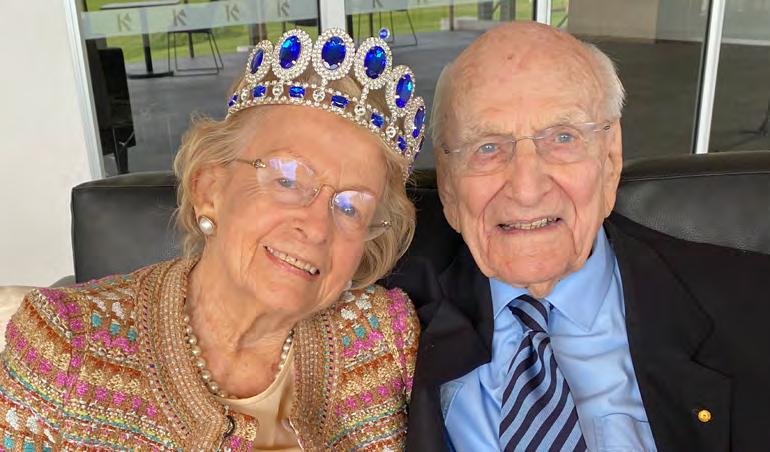
and the most amazing thing about them is that they don’t judge who they help. We appreciate The Salvation Army’s Christian faith and their mission of helping those in need without discrimination. I love their music so much that to set the mood on Christmas Day we still play an old Salvos brass band carols record.
Supporting charity and the Salvos was a decision John and I made together. As we became successful, we realised how fortunate we were, starting with nothing. When I first met John, I was earning more than he was – about 28 pounds a week. As we grew more comfortable we felt it was our duty to give back to the community.
Our family background, along with the humility and discipline we learned, guided us throughout our lives.
What is something you would like to see your generous gift accomplish?
S: I trust The Salvation Army deeply and believe that any money we give them will reach those in our community who need it the most. Having an organisation in Australia that can respond in times of urgency or emergency and help those in need is
crucial for a good society.
Why do you think philanthropy is important?
S: I love giving because I can, and I believe that more people in privileged positions should help where they can.
What is a piece of advice you’d like to share with future generations?
S: Be yourself and venture into the world without being frightened by what you hear on the news. Be adventurous, make your mark, and stay positive. No matter how long it takes the sooner you understand yourself the happier you’ll be.
“We appreciate The Salvation Army’s Christian faith and their mission of helping those in need without discrimination.”
~ John and Shirley Uhrig
95-year-old Robert Raeson shares how a childhood experience and encounter in adulthood led to his generous support of The Salvation Army.

Can you tell us a bit about your background?
I was born in Shanghai. My father was a Scottish marine engineer and my mother an English woman travelling East with her Army father. I was one of three children.
When you look back throughout your working life, is there any one moment/event that touched your heart (or a role that you are most proud of and, if so, why?)
When I first arrived in Hong Kong, in 1953, I was invited to a Christmas Eve party. What happened next formed a deep impression on my life.
I was outside leaning on the verandah enjoying the party – while on the verandah you could see in the distance the mainland where there are hills called the nine dragons in Kowloon. As I was looking out to the hills a fire broke out. A small fire had broken out in one of the small refugee huts – as the huts were made out of highly flammable materials they all caught fire one after the other and 50,000 people lost their homes that night. The homes were all gone in a matter of a few minutes.
I was a journalist at the time and could not get over there. It makes you realise that disaster can hit at any time.
When did you first learn about The Salvation Army?
I learned about The Salvation Army at school. One of my friends, Wesley Morris, was the son of The Salvation Army leader. There was a terrible war going on in China with thousands of refugees, not just Chinese but also Jewish escapees from Hitler’s Germany. The Salvos were in the forefront of giving help.
“Without [The Salvation Army] our community would be without that spark of goodness that lights the path for many underprivileged people...”
~ Robert Raeson
Who was/is the biggest influence in your life?
My school friend, Wesley. He and a friend went one day to a part of the city where there had been a lot of fighting. He picked up a hand grenade. It blew up, taking off his left hand. His face was spattered with shrapnel. From his hospital bed he told his mother, “Don’t worry Mum, it’s only my left hand.” He came back to school wearing a gloved prosthesis, a symbol, of courage to us all.
After the attack on Pearl Harbour on December 7, 1941, he was interned with all the other expatriate residents of Shanghai and spent the next three and a half years in a prison camp. I was more fortunate. Twelve months earlier, my family moved to Australia.
What led you to support The Salvation Army?
My next encounter with the Salvos was years later. I lived in Bondi Junction almost opposite The Salvation Army hall where young men and women in smart blue uniforms practised on their tambourines and cymbals. They seemed so happy in their entertainment.
Years later I remember seeing the more serious side of their lives as one dear Salvo lady walked arm in arm escorting a woman into court charged with the murder of her four young children, Kathleen Folbigg. She was later pardoned after serving 20 years in prison. The Salvos did not let her down.
In another country where I once lived, one of my best friends was chairman of The Salvation Army council. A prominent bank manager, he kept it going through thick and thin, and ensured that its many activities produced good results for impoverished people.
We may not all be prosperous bank managers, but a community without Salvos is like a person without a heart and a conscience. They faithfully follow the supreme commandment to love and care for your neighbour as yourself.
How would you like to see your gift used?
I always pray for the hungry and homeless and when you see what’s going on in Gaza and the Ukraine you feel deeply for people being thankful for getting a terrible mouthful of soup. It makes me feel grateful. I mostly want to see my gifts used for the hungry and homeless and victims of family domestic violence and sexual abuse.
Why would you encourage other people to donate to The Salvation Army?
Today I regularly donate to The Salvation Army because without them our community would be without that spark of goodness that lights the path for many underprivileged people who line our streets, huddle in doorways, beg outside 7-Eleven shops for a coffee and a sandwich, seek refuge from dominating husbands, struggle with alcohol, fall behind in rent or mortgage payments, or are overrun by the wheels of complacency of an uncaring society. The Salvos remind us of our humanity and our need to reach out to the many who fall through the cracks of poverty, illness, unemployment, and failure.
What is a piece of advice you’d like to share with the next generation?
Whatever you do in life be prepared – you never know what’s around the corner. I have two mottos in life –Always be faithful. If you promise to do something make sure you do it.
GIFT IN WILL Moira
“I have been very careful with our money and saved well,” she says. “It’s a natural thing for me to give and think of others.”
~ Moira
Moira was raised in a close-knit Glasgow family. She learned early on the true meaning of compassion and the profound impact of giving. Throughout life’s journey, those values have guided her most important decisions.
She has fond memories of growing up with a relaxed Christian faith. “We would walk to the local church and back on Sundays and every Christmas, we’d go into George Square in Glasgow. The Salvation Army band would play and there’d be hymns and hot soup and rolls. It was perfection. My parents would put money in the Salvos tin.”
When Moira was 18, she trained as a nurse in Glasgow. Soon after she met and fell in love with George, a chartered accountant. They married and in 1989 they emigrated to Australia and in 1995 they moved to Perth, Western Australia. By choice, they never had children and together they built a wonderful life.
Moira is grateful that she’s had abundant love, financial security and safety in her life. She’s aware that many in her community aren’t so fortunate. “As a nurse and in my travels, I’ve met many people who are struggling,” she says. “At times when my husband George was growing up, he also faced hardship.”
She has always felt inspired by people who show compassion and courage in the face of adversity. She will never forget the faith and inner strength of a nurse

That’s why The Salvation Army was front of mind when Moira and George faced a tough time of their own. In the first few years after they arrived in Australia, George could not get a job. When he finally did, they were both filled with gratitude. They had a deeper understanding of the suffering people endure. “As soon as George got the job, he called me. He asked me to make a $1000 donation to The Salvation Army to help others,” Moira recalls.
In the decades since, Moira and George have continued to donate. It’s a practical way to respond to the hardship and injustice they see in their own community. Moira goes for a brisk walk every day in her neighbourhood. As she looks around, she notices more people are struggling and so many are homeless. “I’ve seen people living in their cars,” she says.
Knowing The Salvation Army is taking hope and practical support where it’s needed most has inspired Moira to leave a gift in her Will. Her great hope is that she can help “narrow the divide” between those with and those without. She went to her solicitor for help to prepare a Will that could carry on the values and beliefs she holds so dear.
Moira’s decision to leave a gift in her Will also makes her feel close to her family. “My parents were always generous and would be so proud of my choice,” she says. “I have been very careful with our money and saved well. It’s a natural thing for me to give and think of others.”
HONOURED FRIEND
Robin Adair
“... the Salvos were there with comfort and practical support. It was something Robin never forgot.”
~ Julie Kusko Adair
At 60, Robin Adair, a seasoned journalist, was in hospital for cancer treatment. It was a worry to be so unwell. Robin’s serious illness had forced him into retirement.
One day, a Salvation Army soldier was visiting hospital patients. She was helping lift their spirits. That kind woman also got to know a bit of Robin’s life story that day. As she left, she turned and said: “You will write more – a book this time – and it will be very good.”
Incredibly, after Robin recovered, this prediction came true. His wife of 45 years, Julie Kusko Adair, recalls: “Robin was not a religious man. He initially dismissed her words, as every journalist wants to write a book, and most never do. But perhaps that Salvo had some divine insight. Because Robin went on to become a prize-winning author.”
In the next two decades, Robin would publish three successful crime novels. It was the culmination of a passion for the written word that went all the way back to his childhood in 1940s Sydney. From a young age, Robin had been set on a journalism career. Even before he left high school he was writing stories for Sydney’s major newspapers.
He went on to receive acclaim for his writing, especially for his long-running humorous “Round Robin Adair” column in the Australian Women’s Weekly.

He was acutely aware that financial hardship and unexpected crises can happen to anyone. After all, he’d experienced it himself. Like many of his generation, life during the Depression and World War II was a struggle for Robin’s family.
A time of food and job shortages was made even harder with a mother in and out of hospital. But the Salvos were there with comfort and practical support. It was something Robin never forgot.
“Every Christmas for as long as I can remember, even when money was tight, Robin would include among his gifts a donation to The Salvation Army.” said Julie.
Julie and his daughters Kristin and Sherry were not surprised that he decided to support The Salvation Army with a gift in his Will. He wanted to make a lasting difference to those struggling through homelessness, hardship and crisis.
Robin passed away in 2023, at age 87, after a long and fruitful life pursuing his writing passion. At The Salvation Army, we are so grateful for kind people like Robin and their families. It was such an admirable decision that will build lasting hope in our community.
Click or scan to find out how to leave a gift in Will to The Salvation Army. Go to salvationarmy.org.au/ donate/wills-and-bequests
WILLS STORY
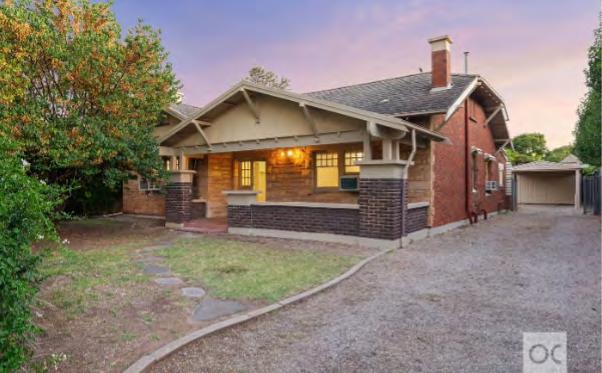
The Salvation Army received a windfall from the auction of a house after the deceased owner of the property left instructions in his Will that the proceeds of the sale be donated to charity.
Real Estate agent James Robertson, of Ouwens Casserly, said the circumstances of the sale of the house were highly unusual but would have been unsurprising to those who knew the former owner, who had a long history of supporting the Salvos.
“I had met the owner a handful of times when he was alive, but I didn’t know what he had done throughout his life,” James said.
“I’ve since learned that he volunteered quite a lot of his time with the Salvos, donating money prior to his passing along with leaving part of his estate as a cash contribution plus the proceeds from the house.
“He obviously felt very passionately about what the Salvos do. It’s pretty amazing.”
The Salvation Army’s Gift in Wills Team Leader South Australia John Tobin said while the homeowner had expressed his admiration for the Salvos support for vulnerable people in the community, he was surprised at the extent of the gift.
“While a growing number of people are including a charity in their Wills, including the Salvos, it is rare to receive a gift of this magnitude,” John said.
“We did suspect that the gentleman had included our organisation in his will, but we were quite amazed and grateful for this incredible act of generosity.”
He said the fact the proceeds were going to charity was a talking point among those attending the
“After friends and family are taken care of, the money you leave to charity is an investment in a kinder, more inclusive tomorrow.”
~ Helen Beeby
auction and would have certainly played a part in pushing the sale price higher.
Include a Charity campaign director Helen Beeby described the donation of the proceeds of a house sale to charity as “incredibly powerful.
“Not only will it make a significant impact on the work of The Salvation Army, but it also highlights to the Australian public the value and joy that is generated from this form of giving.”
Helen said that humans love the concept of leaving a legacy – a stamp that persists long after we’re gone and sets a positive, optimistic example for future generations.
“After friends and family are taken care of, the money you leave to charity is an investment in a kinder, more inclusive tomorrow.”

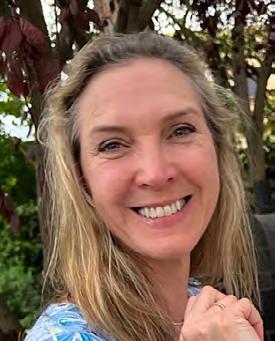
Thank you so much to every individual, family, company, organisation, community group, charitable trust and foundation that has helped us meet great human need in the Australian community. So many suffering people have experienced the transformation and new hope that has been made possible by your kindness and generosity.
We would also like to acknowledge and give thanks to all those donors who have given anonymously. We can’t honour you with a mention here, but we do extend our heartfelt thanks for your contribution and its impact.
AA Holdings Pty Ltd
ADCO Constructions
AGL Energy Ltd
Alinta Energy
Aurora Energy Pty Ltd
Bellrock Broking Pty Ltd
Blundstone Australia Pty Ltd
Coca-Cola South Pacific Pty Ltd
Crown Resorts Ltd
Downer Group
Electel Resources Pty Ltd
FNQ Salvos Champions Pty Ltd
Fortescue
Glencore Coal Assets Australia
Gold Fields Australia
Hancock Prospecting Pty Ltd
Holmes Institute
HopgoodGanim Lawyers
HYTEK Framing Pty Ltd
IG Design Group Australia
Kmart Australia Ltd
Lumo Energy Australia
Macquarie Group Foundation
McCosker Contracting Pty Ltd
Mercer Australia
Mineral Resources
Myer Community Fund Ltd
National Australia Bank
NSW Government - Department of Premier and Cabinet
Origin Energy
Perpetual
Programmed Facility Management
Queensland Government
- Department of Communities, Housing and Digital Economy
Queensland GovernmentDepartment Of The Premier and Cabinet
Real Estate Institute of WA
Rio Tinto Ltd
Scentre Group
Sisters of St John of God
Stan Perron Charitable Foundation
State Government of Victoria, Department of Families, Fairness and Housing
Technology One Ltd
Wilson Group
Woodside Energy Ltd
Woolworths Ltd
Wythenshawe Pty Ltd ATF
Wythenshawe Foundation
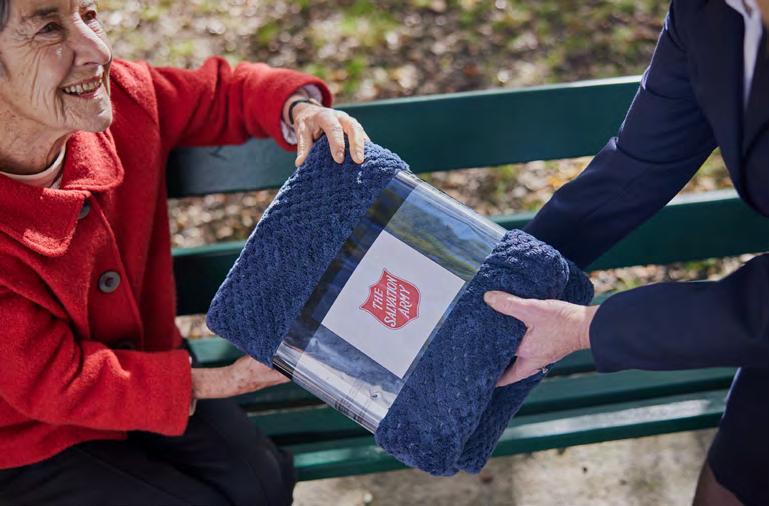
Trusts
ABC Giving Tree Committee
Andrew Pratten Charitable Trust
Australian Philanthropic Services Foundation
Barry Lambert AM - Count Charitable Foundation
Brazil Family Foundation
Brinsmead Hill Family Foundation
Bruce Wall Charitable Trust
Colin Bisdee Trust
Collier Charitable Fund
Crown Resorts Foundation
Ebert Family Charitable Fund
EBM PAF Pty Ltd (Trustee Of The EBM Charitable Trust)
Eleanor Reeve Dailey Charitable Trust
Equity Trustees
Equity Trustees ATF The Hugh D. T. Williamson Foundation
Eureka Benevolent Foundation
Ficus Foundation
Gloria McKerrow Endowment
Goldburg Family Foundation
Grafer Foundation
Helen and David Hains Foundation
Jack Tilburn Endowment
Matana Foundation For Young People
NAB Foundation
Nigel and Patricia Peck Foundation
Philandron Foundation
Queensland Gives, by Queensland Community Foundation
Sargents Charity Ltd
Stan Perron Charitable Foundation
The Cory Charitable Foundation
The D. and X. Williamson Family Charitable Fund
The Dick and Pip Smith Foundation
The Donald and Joan Wilson Foundation
The Dorothy Levien Foundation
The Eddy Dunn Endowment
The Gladstone Foundation
The Gray Family Trust
The Hugh D. T. Williamson Foundation
The Inagh Foundation
The John and Margaret Schneider Charitable Trust
Andrew M. Carter
Angus M. Cameron and Suzanne M. Cameron
Dallas and Margaret Finney
David Hilberg
Dr Bryant and Louise Macfie
Henry F. Foster
Gift in Will
The Manildra Foundation
The MAST Foundation
The O’Halloran Foundation
The Orloff Family Foundation
The Ragdoll Foundation Pty Ltd
The Rock Private Ancillary Fund
The Stan and Maureen Duke Foundation Ltd
The Sun Foundation
The Sylvia and Charles Viertel Charitable Foundation
The Theodore and Isabella Wearne Charitable Trust
The Wheeler Family (NQ) Charitable Endowment
Warren Read Endowment
Jean M. Williamson
John A. Uhrig AC and Shirley Uhrig
John Brett
Laurie and Joan Jones
Margaret S. Ross
Michael E. Burgess
Peter Routley
Richard G. Pinn
Roger Massy-Greene AM and Belinda Hutchinson AC
Russell J. Patterson
Susan Scotford
The Salvation Army is grateful to the many people who have considered the future of people in need in Australia and have made the powerful decision to invest for generations to come via a gift in their Will. We are honoured to recognise and thank these most generous supporters.
The impact of your generosity is helping to shape the future for all Australians. Whether you choose to support a specific area of The Salvation Army’s work, make regular donations or give major gifts, your support is vital and we cannot thank you enough.
To find out how your business or organisation can partner with The Salvation Army, contact us by email: corporatepartnerships@salvationarmy.org.au
There are many ways you can help The Salvation Army raise much-needed funds.
Below are few fundraising ideas for inspiration or you can even create your own:
• Take up a personal challenge (e.g. giving up chocolate or walk 100km) and ask your family and friends to sponsor you
• Participate in a sporting event: run, swim, ride or trek and raise funds to support the work of The Salvation Army
• Commemorate an important milestone in your life by asking your family and friends to make a donation in lieu of gifts for your wedding or birthday
• Organise a garage sale, car wash or cake stall to raise funds
• Donate a percentage of sale proceeds from your business
Go to salvationarmy.org.au/get-involved/ fundraise-for-us for more information.
To make a one-off donation or register for regular giving as a Salvos Freedom Partner, visit salvationarmy.org.au/donate
Active in over 130 countries, The Salvation Army is empowering communities globally to overcome poverty. Your gift can change lives around the world. Visit salvationarmy.org.au/internationaldevelopment/ for more information.
Whether you are interested in strategic philanthropy, have a charitable trust, foundation, or Private Ancillary Fund, or would simply like to arrange a visit to any of our programs, your dedicated relationship manager will be delighted to help. Please contact us at philanthropy@ salvationarmy.org.au to find out more.
Change lives with a gift to The Salvation Army in your Will. Your gift in Will can provide lasting hope for future generations. Please call us on 1800 337 082 or email us at bequests@salvationarmy.org.au to learn how you can leave a gift in your Will or receive support with your long-term planning.
The Salvation Army couldn’t provide the services it does without our dedicated volunteers. Please contact us to discuss which of our many volunteering options would suit you best. Visit salvationarmy.org. au/get-involved/volunteer-with-us to express your interest.

“And do not forget to do good and to share with others, for with such sacrifices God is pleased.”
~ Hebrews 13:16 NIV

